#bengiyo queer cinema syllabus
Text
Bengiyo's Queer Cinema Syllabus
I am currently working my way through Unit 4: Heartbreak Alley, the totally light-hearted, definitely not agonizing section of @bengiyo's queer cinema syllabus where I get to watch countless acts of violence be committed against queer people. Thank fuck I have Lesbians waiting for me at the end of this unit. The films in Unit 4 are: Bent (1997), Strange Fruit (2004),Boys Don’t Cry (1999), Brokeback Mountain (2005), Parting Glances (1986), Philadelphia (1993), The Living End (1992), Holding the Man (2015), Jeffery (1995), and Boys on the Side (1995).
Today i will be talking about
Philadelphia (1993) dir. Jonathan Demme

[Run Time: 2:05, Available on: YouTube for rent, Google Play, Amazon, Lang: English]
Summary: When a man with HIV is fired by his law firm because of his condition, he hires a homophobic small time lawyer as the only willing advocate for a wrongful dismissal suit.
Cast:
* Tom Hanks as Andrew Beckett
* Denzel Washington as Joe Miller
* Antonio Banderas as Miguel
___
To steal a comment from @lurkingshan, it has been awhile since I’ve watched a good legal thriller. Philadelphia is brilliant, and I don’t just mean in the general sense, I mean it is smart. It is smart in how it sets itself up. We start with Andy and Joe on opposites sides of a court room, we can see the rapport between them, but we set them up on opposite sides from the beginning. We move from there to Andy at the hospital, receiving his transfusions, looking across the way to a man whose karposi’s sarcoma has advanced to the end stages a look to where Andy himself will end in this film. And then to Andy’s law office where there is physical touch, after physical touch, after physical touch. Some that happen so quickly, others that linger, that the camera focuses in on, and I only wish that we’d seen Andy the day after that meeting, because I would be curious to see if and how the physical touches changed with people in the office.
But that’s not what we get, and we don’t really need it because what is truly important is that Andy is sicker than he originally let on. The point is that the law firm set Andy up while he was away. The point is that at so many stages in this film I was mad. And that was how I was supposed to be. I was mad at all the homophobic pieces of shit that were sitting there making excuses, that based a significant portion of their legal argument about not discriminating against Andy because he was gay with HIV, by trying to discredit Andy’s character because he was gay. [and of course the law office used a woman as their representation and had a Black man at their table as well…you know they were really trying to look good]
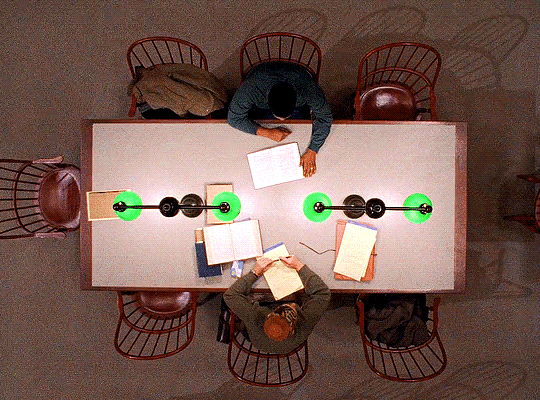
gif by @rancidtofu
You might know by now that I love a complicated relationship, so I was really thrilled that Joe eventually decided to represent Andy. Because Joe was homophobic as fuck, and he very much did not want to take the case. But again this film is smart, we never have to hear from Joe’s mouth or anyone’s for that matter that Joe decided to work with Andy after seeing how he was being treated by the librarian, but we know there’s no way it isn’t informed by experiences of racism in Black communities. The way Joe was stared at by a library worker when he was sitting at his table, the way Andy was stared at by a library worker when he was sitting at his table. The way Andy was being suggestively ushered away to somewhere out of view to other library patrons.
I loved that Joe was viciously homophobic because it demonstrates so well the boundary between work and personal life. Joe is able to do his job and do it well, and eventually after months of working with Andy, is able to come around, even touching Andy’s face which we know even has a lesion on it, by the end of the film. That is huge from someone that started the film literally running immediately to the doctor to make sure he didn’t have AIDS from shaking Andy’s hand. From a modern lens I can totally see how that would probably feel stereotypical or derivative or something like that but I think it is important to keep in mind that this film was one of the first Hollywood movies to feature HIV/AIDS and also portray gay people in a positive light. I haven’t actually been adding the for/by/about designations to the Heartbreak Alley films because something about doing that didn’t really sit right to me when we’re discussing the violence to and death of queer people. But this film definitely was not made for queer people, and Tom Hanks acknowledges that he was cast in the role for his “non-intimidating screen persona” and that “one of the reasons people weren’t afraid of this movie was because I was playing a gay man.”
The casting here was strategic to further assist audiences in sympathizing with a gay, HIV positive character.
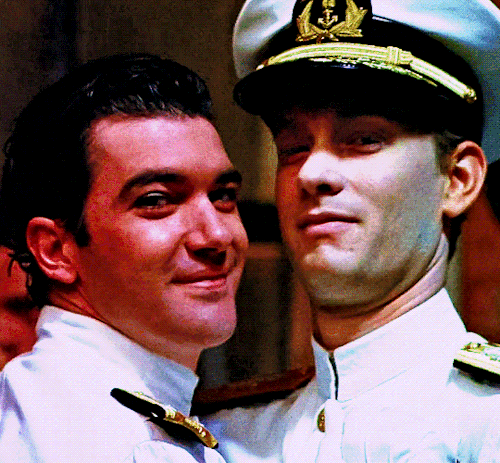
gif by @rancidtofu
I really love all the little moments of solidarity, the smiles between the Black secretary at the law office and Joe because They Know™ about experiences of discrimination in the workplace. The solidarity between the secretary with AIDS and Andy. I loved that a Black woman was teaching Andy how to apply make up to cover his lesions. I loved that Andy’s entire family knew that he was gay, knew he had AIDS, knew he had a partner and that they all loved and accepted him, and that he had so many people in his life that truly, well, and deeply cared for him.
And I love how that is used to deliver maximum emotional impact, at least to me, in one single stupid opera line.
I genuinely enjoyed essentially sitting in a court room for two hours watching Joe strategize, and execute his traps for the jury to win them over. I love how you know that they have won the second that a juror repeats verbatim a line Joe had said repeatedly throughout the trial. I am grateful the film was kind enough to let Andy be awake and alert enough to know that they had won. That his one of his last acts on earth was getting to engage with the part of law he loved most: “that every once in awhile, not often, but occasionally, you get to play a part in justice being done” Justice was done here, Joe and Andy both played a role in what could potentially become another precedented case in the roster to build towards a stronger future for gay people in the workplace. I think that (though likely coupled with how much his body was beginning to fail) is what finally made him ready to go. Because for so much of this film he would hesitate when it came to death.

gif by @rancidtofu
He froze over the line “the actual physical [death]” when quoting the line about AIDS causing a social death. He talked about planning his memorial to try to get a reaction out of Miguel, and when Miguel gave him a response he very much did not want to hear “maybe you should” he took Miguel to a party, he talked about opera instead of practicing his Q&A.
I am grateful the film ends at his memorial, not just for the memories, though I am especially glad it ends on a video of Andy as a child (to appeal to the ‘he was somebody’s kid type of crowd) but that the memorial was not entirely gloomy. There was life, there was conversation, there were smiles, it made things feel more real. Just like all “see you tomorrow” lies everyone knew they were telling themselves felt real.
Tom Hanks and Denzel Washington are such powerhouses of actors and I am so so grateful that they did this project together.
Favorite Scene
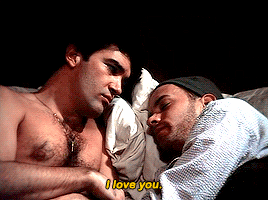
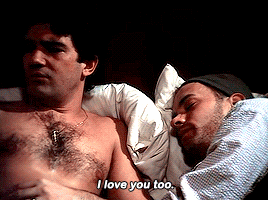
(I am acknowledging that these gifs by @antoniosbanderas have nothing to do with my listed favorite scene, but I just need you all to know that the scene of these two laying in bed was cut from the final edit of the film, so I didn't actually get to watch it, so now you know it exists if you didn't already)
My favorite scene is when the law firm is questioning Melissa Benedict, a secretary that used to work with one of the lawyers in his previous firm. Melissa was diagnosed with AIDS after a blood transfusion, and she was put on the stand to prove one of the lawyers knew what AIDS lesions looked like and therefore was able to identify that Andy had HIV a week before he was fired.
I was ready to reach through my screen to smack a bitch when the law firm’s representation started trying to make a moral argument, that Melissa’s AIDS was acceptable AIDS to have in an office because she involuntarily contracted the disease through a medical procedure, whereas Andy had had gay sex and therefore voluntarily risked acquiring HIV. And you can just see Melissa looking over at Andy so often when the law firm is trying to make this argument, and trying to get Melissa to answer questions in a way that would make her seem like she is actually of the law firm’s opinion.
And she doesn’t let them do that to Andy. Instead she looks right at him and she qualifies her response saying: “But I don’t consider myself any different from anyone else with this disease. I’m not guilty, I’m not innocent, I’m just trying to survive” and it is just a beautiful moment for me. Especially because this film is trying to portray queer people in a positive light, having a straight, white woman with a disease she had no way of preventing say that she was just like anyone else with AIDS is hugely important to driving that message home.
Favorite Quote
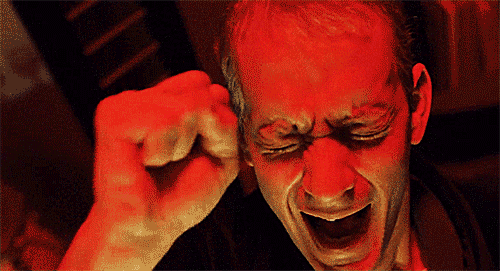
gif by @fran-kubelik
I am so sorry in advance for how long this quote is, and that 90% of it is technically just Andy translating an opera but:
“‘Look the place that cradled me is burning.’ Do you hear the heartache in her voice? Can you feel it Joe? Now in come the strings and it changes everything. It’s like the music, it fills with a hope. And that’ll change again. Listen. Listen. “I bring sorrow to those who love me” oh oh that single cello. “It was during this sorrow that love came to me.” (sobbing) “A voice filled with harmony. It said, live still. I am life. Heaven is in your eyes. It’s everything around you. It’s the blood and the mud. I am divine! I am oblivion. I am the god that comes down from the heavens to the earth and makes of the earth a heaven. I am love. I am love.”
The level of emotion, the implication behind each and every line that he translates, the way that those lines spoke to me as a queer person. “Look the place that cradled me is burning” this body, his body is failing; this life, his life is coming to an end. “I bring sorrow to those who love me” we see that with Andy’s mom, with his entire family for that matter, we see how loved he was and know that his death is going to be a devastating blow for a lot of people. “It was during sorrow love came to me” Miguel is there for all of it, through all of it. When he collapses in court, his family is the first to get to him, to try to help him. When he’s in the hospital the entire hallway is flooded with people that love him. Andy breaks at this point in his monologue, choking out the line “A voice filled with harmony. It said, live still. I am life. Heaven is in your eyes. It’s everything around you. It’s the blood and the mud.” I do not think Andy was ready to go until the very end when he finally said he was. Live still. Andy wants to live still. I am life. Heaven is in your eyes. It’s everything around you. It’s the blood and the mud. He will see Heaven soon, he is looking at the world through the lens of a dying man. “I am the god that comes down from the heavens to the earth and makes of the earth a heaven” We have one life to live, we should use it well, Andy has so much love in his life, that’s truly such a heavenly thing to have. He is seeking justice, in such a way that others might be protected the way he wasn’t. “I am love. I am love.”
I just.
I don’t know y’all I just really liked this film.
Score
9.5/10
I’m salty that Denzel wasn’t nominated for an Oscar, though I am wholly unsurprised, and I am glad Tom Hanks won and that his speech included praise of Denzel.
““And an actor who put his film image at risk and shown because of his integrity, Mr. Denzel Washington who I very much share this with”
Lovely film, highly recommend.
Now on to The Living End
#bengiyo queer cinema syllabus#queer cinema syllabus#unit 4: heartbreak alley#philadelphia#philadelphia (1993)#denzel washington#tom hanks#antonio banderas#and with this film I am now 60% of the way through Unit 4#I can see the finish line
56 notes
·
View notes
Note
Hello hello ~~
Through wen-kexing-apologist's recent post about The Birdcage (which seems to come from your syllabus for baby gays) I got to the original series of reblogs which resulted in said syllabus. I read most of it (not everything because Real Life has my time hostage), and as someone who has seen her fare share of queer media I have now a pretty long to watch list.
As you wrote about how you enjoyed the romance of queer media I have a question.
Recently I have come across a Netflix movie trailer called Love at First Sight. With such a basic trope as a name I checked it out hoping the title to be misleading and to see something surprising in the plot. The disappointment I felt when by the end of it I realized it was exactly what the title sold: the most basic boy meets girl and they have to look for each other throughout the whole movie.
One of the things I really appeciate about queer media (and mainly BL probably) is the possibility to explore different kinds of romances and emotions. Both positive and negative. From Not Me to Heartsopper to Double Mints. I feel that being "out of the norm" they explore such emotions and situations in a more interesting and relatable way (and add to that that I, as a woman, cannot stand women characters making a 360º personality change once they fall in love)
So here's my question: what unusal or out of the ordinary romances would you like to see more of in BLs/queer shows/etc?
I personally would like romances with disabled characters to be more explored (I'm really looking forward to Last Twilight) or polyamory. Also more GL.
I admit this might be a very biased ask, it comes 100% from my subjective view, and I have yet to watch most of the movies in your syllabus for Baby Gays.
Anyway, I hope you have a great day and that this long ask won't bother you ❤
Well look at this ask! Let me get into this!
The Syllabus is on a Google Doc
First, I sincerely appreciate you watching me and @shortpplfedup go back and forth about stuff. For yours and others' convenience, I did put the Queer Cinema Syllabus in a Google Doc for @wen-kexing-apologist
Some Recommendations
If you're looking for a film with a disabled protagonist and also a bit about women, I would recommend checking out Margarita With a Straw (2014), Sleep With Me (2022) (I watched on Gaga), or if you're willing to tolerate hets Isa Pa With Feelings (2019) (currently on Netflix) or Silent (2022) (Viki)
If you're interested in more polyamory, I genuinely think that Quaranthings Season 2 (2021) does some really fascinating stuff worth checking out. We had complicated feelings about Me, My Husband, and My Husband's Boyfriend (2023), but I liked it.
What do I want though?
I think this is a harder question for me to answer than I was expecting. I see myself as a guest when I'm watching a lot of content from Southeast Asia. I will voice my opinion on what I like and don't like, what I'm taking from these shows, and how they're affecting me. However, I don't really consider myself the target audience. I watch the shows as legally as possible and help generate engagement, but the "interfans" they care about are the English-speaking Asians in their region, not really me I feel like.
So when I think about what I want, I don't feel a yearning for any of the BL-producing Asian countries' film industries to make it for me.
I want to see the shit I like in the West get made. I want to see Black queer people presented complexly (Here is my regular plug for For The Boys). I'm a fat black gay nerd. The last time I saw a fat black gay nerd that I liked in an American production was Fire Island (2022).
I'm a 33-year Star Trek fan who still thinks we need more GAYS IN SPACE. I'd like to see more productions like Sort Of (2021- ) where complex queer friend and social groups navigate just existing in the world and finding love and meaning. I'd like to see less of reboots of classic shows like Queer as Folk be about a horrifying mass death event in the city I live in and the spaces I frequent (I refuse to link to it).
I want to see TJ Klune's, Ginn Hale's, or Lynn Flewelling's works adapted to series. I would like to see more wide release queer shit in the West not be overwhelmingly about fit, attractive, young white guys.
I want distribution for queer stories to not always have to go through four years of distribution hell because of the film festival circuit.
I want the West to try to make BL! I don't care if it feels cheap on the front end. I just wish more of us would be willing to throw support behind web shows. We did it for Awkward Black Girl! We can do it again!
This is turning into rambling, so I'll say that I don't necessarily have strong feelings about what I absolutely need to see. I like connecting with the specific humanity of stories, especially if they're about queer people. I didn't know I needed Moonlight (2016) until I saw it. I didn't know I needed Make the Yuletide Gay (2009) or Black Sails (2014-2017) until I watched them.
I just want more people with ideas to get a chance to turn them into something cool for us.
What about the rest of you? Please tag me if you have things you're hoping for.
41 notes
·
View notes
Text
Bengiyo's Queer Cinema Syllabus
Hello! After a holiday hiatus, I am returning to @bengiyo's queer cinema syllabus. We will be ringing in the new year with Unit 4: Heartbreak Alley, the totally light-hearted, definitely not agonizing section of the syllabus where I get to watch countless acts of violence be committed against queer people. That fuck I have Lesbians waiting for me at the end of this unit. The films in Unit 4 are: Bent (1997), Strange Fruit (2004) [cannot for the life of me find this film], Boys Don’t Cry (1999), Brokeback Mountain (2005), Parting Glances (1986), Philadelphia (1993), The Living End (1992), Holding the Man (2015), Jeffery (1995), and Boys on the SIde (1995)
Today I will be writing about
Brokeback Mountain (2005) dir. Ang Lee
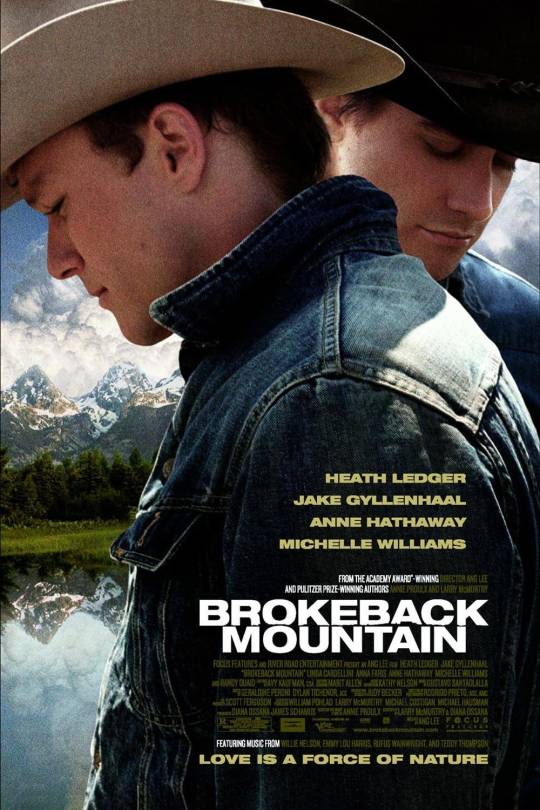
[Run Time: 2h 14 min, Lang: English]
Summary: “Ennis and Jack are two shepherds who develop a sexual and emotional relationship. Their relationship becomes complicated when both of them get married to their respective girlfriends.” -imdb
Cast:
* Jake Gyllenhaal as Jack Twist
*Heath Ledger as Ennis del Mar (Rest in Peace)
__
Okay, so unsurprisingly Brokeback Mountain is one of seven of the movies on this syllabus that I had seen before I embarked on this project. I watched it for the first time in 2021 and walked away from it with two images in my head: Jack and Ennis’ reunion kiss and Jack getting his face bashed in with a tire iron. This film is in Heartbreak Alley for a reason and that’s because it is fundamentally depressing as fuck. Jack and Ennis are stuck in unhappy marriages, lonely all their lives, struggling to carve desire out of a life that does not let them have it. Ennis ends up alone, and Jack ends up dead and these things are important. Ennis slipped out of his role as attentive father and doting husband the second Jack walked back in to his life, Jack kept breaking his own heart by daring to dream of the life that he wanted.
A life he was denied.
I want to mention these tragedies up front because I want primarily to talk about something else in this film. But i do not want to just push past the violence here. This is probably something other people have heard, it was definitely something I was told by the person who recommended this film to me the first time. But the way Jack dies, the way Earl dies, these are both similar to the way that Matthew Shepard died. Matthew Shepard was kidnapped, pistol whipped, tortured, and tied to a fence in Wyoming for being gay and was so brutally beaten his entire face was covered in blood. Jack was beaten to death with a tire iron on the side of the road, Earl was brutally tortured and left in a ditch. These men are not just killed, but brutally, violently, torturously murdered for being queer.
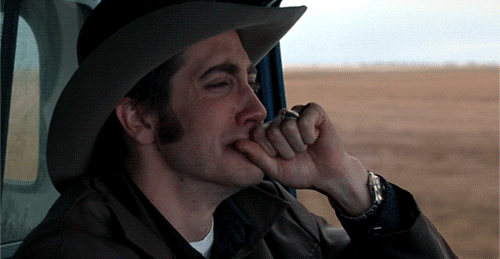
That said, this movie felt so different to me the second time I watched it and I am so amazed to see how much I truly missed my first time around. I was younger, freshly queer, and did not have anywhere close to the extensive queer media viewing history I do now. It is wild to me to see how I have grown in my engagement with media after spending a year writing about body language. Because this film is so fucking brilliant, like legitimately intelligently crafted in it’s displays of gay politics. Maybe this is stuff that I picked up on subconsciously the first time through because I never found the movie boring despite it being rather slow. But this time? My brain was buzzing at how expertly crafted the dialogue and body language was around trying to be safe while being queer.
I am thinking of the way that Jack sizes Ennis up at the beginning, Jack’s posture as he leans against his truck the first time they meet. I’m thinking about the line “Mr. Augirre’s got no right making us do something against the rules” when you consider that queerness is very much against the rules at that time and in that place. The way Ennis refuses to let Jack be gentle with him at first, tending his own wounds, staying distant and quiet, until he doesn’t.
Maybe it’s just because of how much I’ve watched The Sign drift further away from the hyper-masculinity aspect of their story, but I could not stop thinking about the delicate dance that is required to navigate the growing feelings and sexual relationship between these two extremely masculine men. I started looking and I think there are about three times in the entire movie where Jack and Ennis are soft with each other. The first is on Brokeback the second time they have sex, and Ennis is struggling and just rests his head on Jack’s chest before going in for a kiss. The second is when they are cuddling in bed at the motel after their first reunion. The third is the scene after Ennis tells Jack he won’t be able to see him again until November. That’s it. Otherwise they aren’t touching, or when they are touching they are rough, rough housing, rough kissing, rough fucking it doesn’t matter.

Ennis says he isn’t queer and Jack says he’s not either, but they fuck and then they are drawn to one another for the rest of their lives, because there is no one who could get it like they do. Ennis isn’t lying when he tells Jack that is the most he’s spoken in a year. Ennis is a lonely man. Ennis is a rural, hyper-masculine rancher he does not have emotions, not anymore, if he ever did. Whatever conscious or subconscious queerness he had undoubtedly shriveled and died the day he was shown Earl’s body. And that, I think, is part of why Ennis is just constantly drawn to Jack, why his face lights up when he sees Jack, why he throws such caution to the wind upon their first reunion.
Ennis does not need words for Jack to understand him. Jack is also a rural, hyper-masculine rancher. He gets it in a way that Alma never will. The violence they bestow upon each other, Jack understands why Ennis would lash out. The need to escape in to the mountains, Hack understands why Ennis needs it. It’s just so smartly written. Ennis so unmoored from his own feelings that his body physically rejects them when he and Jack separate for the first time. The way he has to suck it in, suck it up, pretend like he’s unfazed, unaffected, until the minute he has a chance to be out of eyesight, and then he just collapses retching, sobbing, punching walls.

And then he’s able to separate himself from his emotions once more, he marries Alma, he stays lonely, he does his duties, until Jack comes calling. I think I remember a story about how the first kiss that Heath and Jake have when Ennis and Jack are reunited, their faces slammed together so hard one of them almost broke a nose. And that is how 90% of Ennis and Jack’s relationship is. Those emotions come back and then Jack is leaving again, and Ennis just starts to crumble.
I could not stop thinking about the dialogue in this film Mr. Aguirre’s carefully chosen words when he is telling Jack exactly why he isn’t hiring him for another season, the way Jack tries to suss out if the man sitting next to him at the bar after the rodeo is queer and down to fuck, how that man picks up on it, rejects him, and how quickly Jack gets the fuck out of the bar afterwards. The inherent understanding of what being invited to the cabin means in that conversation with David Harbor’s character. GOD, it’s just so well done.
Favorite Moment
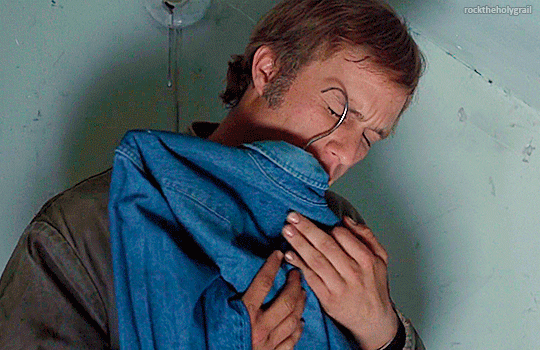
To continue on the subject of incredible code work in this movie, my favorite scene is when Ennis goes to visit Jack’s parents to try to get Jack’s ashes so he can spread them on Brokeback Mountain. How without ever saying anything directly, Jack’s parents are able to convey that they know the reason Jack died, what Jack and Ennis were to each other, and that they accept Jack and accept Ennis was just beautiful. The way she lets Ennis go up to Jack’s room, Ennis finding the shirts, stained with blood because that’s what it is to be queer, Jack’s mother letting Ennis take those with him, Jack’s father saying: “We’ve got a family plot. He’s going in it.” as Ennis is about to walk out the door, Jack’s mother saying: “You come back and see us again” and not have either of those things feel like a threat or a trap? It was incredible.
Favorite Quote
Hmm, I know we have the two famous quotes, but it’s hard to pick a favorite line because there is so little dialogue in this film considering it is over two hours long. I think I am going to go with the last line of the movie:
“Jack, I swear”
Cause it made me cry. Alma Junior pays a visit to her father to let him know she’s getting married, and she drives away forgetting her coat, and Ennis opens his closet (intense staring at the visual commentary) and he buttons the top button of Jack’s shirt, and he swears to Jack and to me that feels like a wedding vow.
Score
10/10 This film is gorgeous, just utterly beautiful all around. The cinematography, the script, the commitment and the care the actors give to these characters, to the subject. I am so glad this was on the syllabus so I had this opportunity to revisit this film. I got a whole lot more out of it as a result.
#bengiyo queer cinema syllabus#queer cinema syllabus#queer cinema#unit 4: heartbreak alley#brokeback mountain
74 notes
·
View notes
Text
Bengiyo's Queer Cinema Syllabus
A few months back I was chatting with @bengiyo when the subject of queer cinema came up (unsurprising considering…ya know, the whole being BL buddies thing). As a semi-recent queerness realizer, and a Certified Baby Gay(™), Ben took it upon himself to share a post between himself and @shortpplfedup that inspired @the-conversation-pod and which also included a Completely Hypothetical Queer Cinema Syllabus Build Up to BL for Baby Gays. According to @bengiyo this started as a thought experiment.
But, unfortunately or…fortunately? for him, I constantly crave queer media, and @waitmyturtles and her Old GMMTV Challenge have inspired me to try my hand at working my way through this syllabus. I cannot guarantee that I will finish all these films. I have no idea how long it would even take, but I wanted to at least try!
I have been saying I would do this for months now, but I am inundated with BL content, and getting more every day, so I have been pushing it to the side. BUT! This evening a local movie theater played The Birdcage (1996) and I went and bought tickets and decided now was as good a time as any to get this started, I am hoping to take a page out of Turtle’s book and write notes/thoughts on the movies I end up watching. Forgive me the long winded introduction, but I figured some context would be nice if this ends up being a thing I stick with. So without further ado…
The Birdcage (1996) [Comedy]
Syllabus Unit 6: Gems

Summary: A gay cabaret owner and his drag queen companion agree to put up a false straight front so that their son can introduce them to his fiancée's right-wing moralistic parents.
Characters:
Armand: Gay cabaret owner, played by Robin Williams
Arnold: Drag queen partner, played by Nathan Lane
Val: Armand’s son, played by Dan Futterman
Agador: Armand and Arnold's maid? friend? live in slutty pool boy? played by Hank Azaria
Katharine: Val's biological mother, played by Christine Baranski
Overall Reflection
This is a film I had never seen before. Hell, I didn’t even know it existed until around the time Ben shared his syllabus, and someone reblogged a scene from it that ended up on my dashboard. This was an interesting film to experience in theaters, because while watching with an audience made the funny bits funnier, there were also moments that I absolutely did not read as funny that other people did, and I didn’t know how I felt about that.
This film is set primarily in South Beach, Florida and partly in a drag club, which meant that the only thing I could think about whenever the drag club was on screen was Palace, the gay bar, drag brunch, queer club spot in Miami. On the other funny casual note, as a Floridian I feel seen by the moment where Katharine calls and says she’s going to be late, and it zooms out to show she is stuck at the bridge. Real.
I feel like the majority of gay media I have consumed in my life very much centers around two very masculine characters. So it was really nice to watch a story that involved more femme characters, and that the femme characters were not left as the butt of the joke. Which I recognize might be ironic considering this is a comedy and therefore there are jokes abound. But, when you compare the femme character in something like Legally Blonde, to the femme characters here, they are allowed to be dramatic, and they are allowed to trip and fall, but the love that Armand has for Arnold is palpable, they squabble and they get annoyed at each other, and they hurt each other, but they are partners, and they love each other too, and it shows throughout the film.
This sounds fucked up, I guess, but I love the undercurrent of pain that is threaded throughout the story. The way that Val starts off seeming like he is very content with the way he grew up, the parents that he had. The way that Val feels so so loved by his Dads, and he hurts them anyway. Because he is scared, because he loves Barbara and he knows that she is good, and that her parents aren’t, and that he has to hide his family. But in making them hide who they are, he is hurting them and at first you can see and feel the ways that Armand is trying to rebel against it. You can tell that initially he is angry, disappointed, upset, incredulous:
“Yes, I wear foundation. Yes, I live with a man. Yes, I'm a middle- aged fag. But I know who I am, Val. It took me twenty years to get here, and I'm not gonna let some idiot senator destroy that. Fuck the senator, I don't give a damn what he thinks.”


gifs by @hellboys
It is one of my favorite lines in the film. Because Val needs to be called out on exactly what he is asking his father to do for him. Because Armand's pain is visceral in this moment. But Armand loves his son and so eventually he relents.
Arnold’s presence and importance in Val’s life are constantly disregarded and he is allowed to be upset, and Armand is allowed to constantly put his son’s engagement and wedding in jeopardy to prioritize his partner and his partner’s feelings, because Arnold is a part of this family, and to hide him away is unfair.
I certainly had to grapple with some complicated emotions around the character of Val. I could understand where he was coming from, that he loves his fiancee and that their families have to meet, and that it is almost certainly physically safer for everyone if his parents are not visibly and obviously queer around the ultra conservative moralist senator. But the ways he ends up exhibiting casual disdain, anxiety, and judgment around the aspects of his parents’ home, his parents’ friends, his parents’ themselves makes me kinda hate him a little bit. It is hard for me not to see Val as entitled, not to consider him low-key dickish, because of how frequently he seems to get annoyed and disappointed that Armand and Arnold are not acting straight enough, that their house isn’t straight enough, that their family isn’t straight enough. But the film does not shy away from the mental toll it takes.
Were there aspects of the film itself I didn’t like? Honestly, not really. There are some jokes and terminology that do not fully stand the test of time, so if I watch it with a modern lens I think I would give it a 9.5. If I watch it in the context of the time it was written, I would probably give it a 9.8. But watching it in theaters certainly altered the way I engaged in certain scenes.
Mostly with the “I know what you’re thinking. You’re thinking dressed like this, I’m even more obvious” scene.

gif by @rosalie-starfall
Because people in the theater were laughing during this moment. Which is not to say I am judging them, I’m not mad at them for finding the moments leading up to that scene funny. I can understand how Arnold constantly having to catch himself and change his body language could come off as funny. But there is a weight to that scene for me that made the laughter feel incongruous. It is, in my opinion, an incredibly impactful scene. And it was hard for me to fully embrace that moment the way I know I would have if I was alone, after I realized that not everyone reads that scene as a serious one.
(Side Note: When I was looking for pictures of the movie poster, I found three different versions of it, and I chose the one above because it was the most intriguing to me in the way it presents Arnold. Because it is the only one of the posters that puts Arnold in a suit.)
The other moment, that I think I would have had a stronger response to if I was alone, was the moment near the end where Val takes off Arnold’s wig and introduces Arnold as his mother.

gif by @nicholasbritel
If I had watched this scene alone, I think there is a very high likelihood I would have gotten teary eyed during that moment. Because Val has spent so much time throughout this film trying to hide Arnold away. Wanting to send him off for the evening so they didn’t have to worry, trying to replace him with his biological mother, who he had never really met just for the sake of maintaining appearances.
Arnold LOVES Val. It is glaringly obvious from the first moment they share a screen that to Arnold, that is his kid. And I cannot imagine what it must have felt like for Arnold to literally have his every move critiqued and criticized for acceptable levels of gayness by his son and his partner. To feel unwanted by his son and his partner. To feel replaced by his son and his partner. He deserves to see and hear his son choose him, to know that Val considers Arnold his parent. Especially when Val’s biological mother is standing right there.
And as for the comedy aspect of this movie? I mean, it’s Robin WIlliams and Nathan Lane so it is obviously going to be a truly hilarious film all the way through.

gif by @argentinosaurus
Where does it fall in my By, For, About Queers Categorization?

For and About
Any piece of media that places queer characters at the center of it is something I would categorize as “About Queers”
As far as I can tell, the writers and director are not queer. I consider films to be made By Queers when a queer person has a role in controlling how the story unfolds, usually this means a writer or director for me, actors too if they have any influence over changing the story. (As an example, The Last of Us Episode 3 would be something that I would place in a By Queers category because Murray Bartlet who played Frank is gay and also was consulted to shape the way the characters were written and the story played out.) While Nathan Lane is gay, and I am sure a number of actors who play side characters are as well, I do not know how much influence they had over the film itself. Which is why I am currently excluding it from the By Queers categorization.
And as for the For Queers aspect? That moment where Arnold appears in a suit and tie before the dinner party, where he appears so much more obviously gay when he’s in “masculine clothes” that is written for the people who understand. The undercurrent of pain I mentioned, that exists to be recognized by the people who understand. Also, I watched this at the movie theater and I saw what kind of crowd it drew lmfao.
Favorite moment in the film?
Well, I could go sappy with it and pick one of the scenes I referenced above, but I would be lying. My absolute, hands down, no contest favorite moment in this film was seeing Agador in this cropped tank top:


gif by @thevelvetgoldmine
Now, I know that Ben told me that the Units could be done in any order, but I think I want to start from Unit 1 and work my way through from there, so stay tuned for a write-up about Pariah (2011) from Unit 1: Coming of Age Post Moonlight.
#the birdcage#robin williams#nathan lane#bengiyo queer cinema syllabus#wka long post#queer stories#queer#lgbtqia
137 notes
·
View notes
Text
Bengiyo Queer Cinema Syllabus
Not to sound repetitive but, I had a busy couple weeks, but finally had a second to return to @bengiyo’s queer cinema syllabus. I am currently working my way through Unit 4: Heartbreak Alley, the totally light-hearted, definitely not agonizing section of the syllabus where I get to watch countless acts of violence be committed against queer people. Thank fuck I have Lesbians waiting for me at the end of this unit. The films in Unit 4 are: Bent (1997), Strange Fruit (2004), Boys Don’t Cry (1999), Brokeback Mountain (2005), Parting Glances (1986), Philadelphia (1993), The Living End (1992), Holding the Man (2015), Jeffery (1995), and Boys on the Side (1995).
Today I will be talking about
Parting Glances (1986) dir. Bill Sherwood

[Run Time: 1:30, Available: tubi and fubo, Language: English]
Summary: As Michael and Robert, a gay couple in New York, prepare for Robert's departure for a two-year work assignment in Africa, Michael must face Robert's true motives for leaving while dealing with their circle of eccentric friends, including Nick, who is living with AIDS.
Cast:
John Bolger as Robert
Richard Ganoung as Michael
Steve Buscemi as Nick
__
Well, I have to say this was very much not what I was expecting for the first AIDS related movie of the syllabus. After some pretty hefty violent deaths of queer characters in the first half of Unit 4, I was very much anticipating the heart wrenching tragedies to continue immediately once I hit the AIDS epidemic portion. But Parting Glances very much subverted my expectations of what I was walking in to, because honestly…so much of it was lovely.
It’s not that tragedy is not a part of this movie, it is, it’s just hidden under the layer of friendship, community, and love that feels like the core theme of the film. I am thinking about the party at Joan’s and how much happiness and celebration was happening there, with community abound, and yet how Michael kept telling people they should call Nick because he would appreciate it, showing just how much Nick has lost of his own community since his HIV/AIDS diagnosis.

I really loved how real these relationships to one another felt, the way that Michael and Robert were playful with each other, the way that Nick sat on Michael’s lap so casually for a few minutes when Michael cooked him dinner, I loved the conversation Robert had with his ex-girlfriend, the young and hopeful queer boy who wished to live forever. I just loved watching the queer community be a queer community.
Even in the moments that get a little dour, where Michael gets especially weepy with Nick, those scenes did not make me sad, did not destroy me the way other films in this syllabus have, because that is just grief. Grief is a mighty and terrible thing, but I find beauty in it as well. I find beauty and loveliness in the fact that those tears came from Michael finally admitting to Nick that he loved him, that Nick got to hear himself that he was loved, especially when so many people seemed to have fallen away from him after his diagnosis. I find comfort in the conversations about death that Michael and Joan have together, because those are conversations I’ve had, they feel familiar, they feel like a natural part of life, perhaps they should not have to feel those points so soon, but Nick himself is right, living forever is the only thing none of us can do.

I really loved that we saw Nick when he was at a stage in his illness where he was simply being careful, but was still full of life, energetic, that he was able to be a support system for Michael and was not only being tended to. We know what is coming, but we are not made to see it. I was really in to what the film did with it’s use of ominous backing track, that Nick could hear it, that it felt like the progression of his illness, that it felt like a sense of impending doom, a cloud that hangs over Nick.
Throughout a lot of this film I found myself thinking about The Inheritance Part One & Part Two, a play written in 2016 based off of the book Howard’s End by EM Forster. I saw this play a few years back and was lulled in to a false sense of security that this would not be a play about AIDS because it was set in the relatively modern day with a focus on younger queer characters, but ohhhhhhh how wrong I was. Towards the end of the first part, we hear a story from a character named Walter, an older gay man that lived in the same building as the main characters, and he recounts the story of his life, how his husband, Henry, built a farm outside of New York city for the two of them to live in…right around the time that AIDS started decimating the area. How that distance still was not good enough for Henry so he would leave on business trips, because his fear of catching AIDS was so strong.
Walter tells the story of when he went back in to the city for the first time, and ran in to a friend he used to know, who had acquired AIDS and was on the brink of death. He talks about how when Henry was away, he brought that kid to the farm Henry had built to hide from AIDS, and Walter cared for that boy until he died. Walter talks about doing that again and again and again and again, dozens of times, he would go in to the city, bring a friend back home, and care for them until they passed.
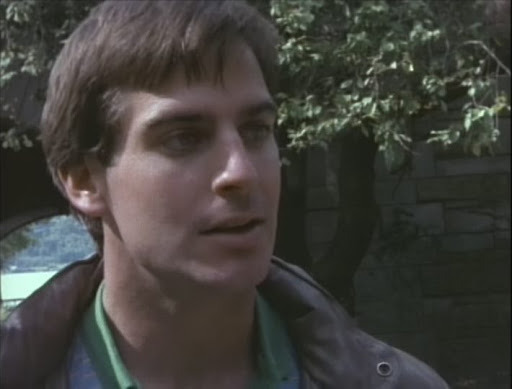
^[sidebar: I very much do not like Robert]
Part of the play ends with Walter being asked what it was like at that time, Walter asks the main characters to name someone they know, they give a name, he says “they’re dead. Give me another name, he’s dead”. For what felt like minutes, name after name after name is called and name after name after name is dead. When I saw that scene I broke down in the theater, I cried for the entirety of the walk back to the train station, I was brought to the brink of tears at the thought of that scene for a month after I saw the show.
I mention this because it was all that I could think about while watching Robert and Michael interact with one another, while seeing this plot unfold. Robert fleeing New York while Michael stayed to care for his dying friend. Knowing that Walter and Henry stayed together after all was said and done, after Henry had stopped running from reality, and the death rates had slowed; then seeing Robert decide not to go to Africa, and how Michael did not show any signs of planning to break up with Robert knowing, despite knowing how Robert felt too settled, how Robert had chosen to go, despite knowing that Robert was running from loss, and running from being a support for Michael when the love of his life finally dies.
So despite the fact that Parting Glances didn’t evoke the same feelings, though I felt like overall it was a relatively upbeat, uptempo, gentle film, the current underneath it all, the dying underneath it all, the tragedy is right there but it is just out of reach.
Favorite Scene
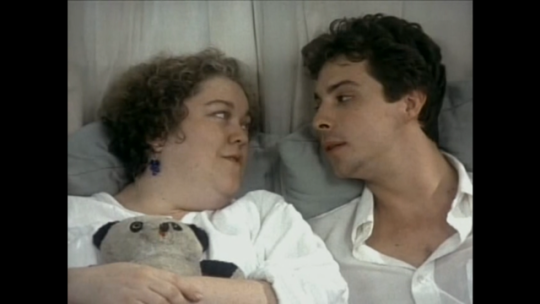
I think my favorite scene is when Joan and Michael are laying in bed together, holding stuffed animals at Robert’s going away party while they just casually talk about death and dying. It just felt very much like a conversation I have had with my best friend on multiple occasions, especially lately because we've had a number of deaths happen in our lives recently. And yes, my friend and I both match the type of conversation part this scene, and also the beating each other up with stuffed animals part of this scene.
Obviously we do not spend enough time with the other characters at the party to know exactly what is going on in their lives, and there is not doubt many if not all of them have lost loved ones to AIDS, but we know that Joan and Michael are really the only two people who go and visit Nick, and it feels so symbolic of the weight that they are shouldering caring for their dying friend to have the only two people who have not cut themselves off from Nick be sitting together, in another room away from all the other gay attendees, discussing, speculating, joking about death.
Favorite Quote
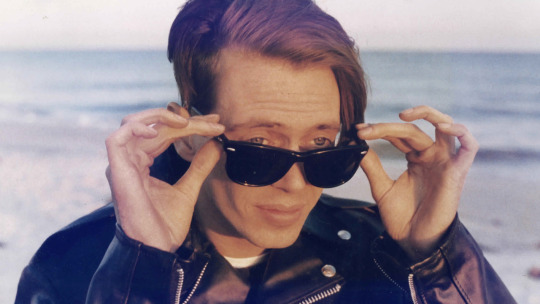
We all know the real right answer is: “Straight men are jerks. Gay men are jerks. Straight women are jerks. That leaves lesbians and they are off in their ivory towers laughing their heads off at the rest of us. I should’ve been a dyke”
But I am going to go for the more serious:
“...look at the others, waiting, wondering if some innocent moment of pleasure long past can set them up with the ultimate form of [German word my subtitles did not state]... I’d like to stage a piece in which all of the performers are people who are terminally ill, can you imagine the intensity, the concentration, the purpose”
This is said off-handedly in a conversation between Joan and a heterosexual male artist who was attending the party. I put it here for two reasons: a) the first half is a very succinct commentary on the state of the queer community (at least who were at the party) and feels like general commentary about the movie’s premise as a whole. Especially because Nick talks about how he didn’t realize how long the gestation period of HIV was, and by the time he started taking protective measures it was already too late. b) because the second half is just the most pretentious, absolutely mindless, careless, and shitty thing to say to someone who is actively losing a friend to a terminal illness. This fucking hetero artist came in to a room full of queer people and decided that dying people would be great to put in to his next project for ~The Vibes~ and I love that comment so much because first, it shows how much he Does Not Get It, and second because of how much disgust is baked in to Joan’s “Excuse me” as she leaves before he can finish his thought.
Because to say that to someone who is watching loved one after loved one after loved one die before their eyes is an absolutely disgusting thing to do (in my opinion).
Final Score
8/10
Up next, Philadelphia (1993)
#bengiyo queer cinema syllabus#queer cinema syllabus#parting glances#parting glances the movie#parting glances (1986)#unit 4: heartbreak alley
27 notes
·
View notes
Text
Bengiyo Queer Cinema Syllabus
Hello! After a holiday hiatus, I am returning to @bengiyo’s queer cinema syllabus. We will be ringing in the new year with Unit 4: Heartbreak Alley, the totally light-hearted, definitely not agonizing section of the syllabus where I get to watch countless acts of violence be committed against queer people. That fuck I have Lesbians waiting for me at the end of this unit. The films in Unit 4 are: Bent (1997), Strange Fruit (2004), Boys Don’t Cry (1999), Brokeback Mountain (2005), Parting Glances (1986), Philadelphia (1993), The Living End (1992), Holding the Man (2015), Jeffery (1995), and Boys on the SIde (1995)
Today I will be writing about
Boy’s Don’t Cry (1999) dir. Kimberly Pierce

Content Warning: rape, murder, self harm
[Run Time- 1:58, Lang: English] [I was not able to find Strange Fruit anywhere online so will investigate my library to see if they have a copy]
Summary: A young man named Brandon Teena navigates love, life, and being transgender in rural Nebraska.
Cast:
*Hilary Swank as Brandon Teena
*Chloe Sevigny as Lana Tisdel
*Peter Sarsgaard as John Lotter
*Brendan Sexton III as Tom Nissen
*Alicia Goranson as Candace
Side note: Boys Don’t Cry is based on the true story, and real life rape and murder of Brandon Teena, who was 21 years old when he was killed in Fall River, Nebraska.
__
To start, I’m glad that I looked this film up before I watched it so that I knew what to expect. I don’t know how often this will occur throughout the syllabus, but while the syllabus itself is a lead in to BLs it seems to be structured towards Baby Gays, which means that I am expanding my knowledge of famous trans people in history beyond Stonewall. I didn’t know who Brandon Teena was until I looked up this movie, I didn’t see his name printed in anything until I read Transgender History.
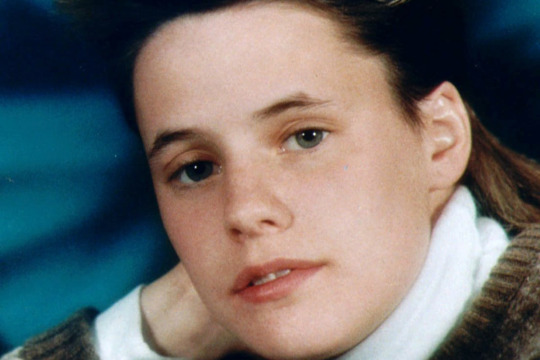
I am having a delayed reaction to this movie. While I was watching it, I was able to bear witness to the violence, it was graphic, and brutal, but I knew it was coming, I had time to prepare myself, I could abstract the violence being done in to a fictional character, I could remind myself it was a movie when the cameras panned away from the dead bodies and I could see the supposed corpses breathing. And then it was over and I couldn’t escape it anymore. I couldn’t escape the knowledge that this was real, that this actually happened, that what I had just watched, what I was not spared from, was bearing witness to an actual crime, to actual violence, rape, murder of an actual, real human being, of Family.
I said this in my last post from Heartbreak Alley that I went in to this section just expecting to be put through the wringer for almost the entire length of a film. I would say I went in to this unit expecting to feel my skin crawling the way it did with Mysterious Skin. Instead I have been gifted all sides of queerness: acceptance, homophobia, love, hatred, joy, pain, gentleness, violence. I want to talk for a bit about how grateful I was to see Brandon happy. His experience in this film does speak to truth, to trans experience, the complexity of being loved by a family member but not having your identity respected. Brandon’s cousin cuts his hair short for him, but can’t call him a man. Brandon gets in a bar fight and is beaming afterwards cause he got a shiner, cause random strangers didn’t clock him as trans. Brandon stays in Fall River for far longer than he should because he is riding the high of just getting to exist as himself. I know a number of friends who wanted to immediately get the hell out of dodge when they started their transition. Hell, I barely return home myself.
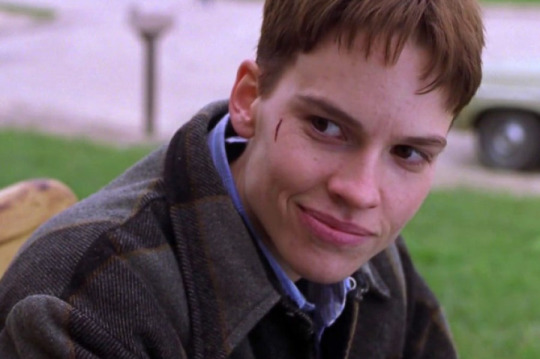
Brandon does stupid boy things, he flirts with every pretty girl, he pushes his own boundaries because he wants to prove that he is a man. He smiles. He smiles often. He smiles widely. He smiles. I loved how much he smiled in this movie. I love that his life was not all suffering. This movie is kind to Brandon while still having to put him through the inevitable.
This movie speaks to queer strength and queer fears, Brandon knew the people who raped and murdered him. They were his friends, he was their friend. They smoked together, drank beer together, and tried to dodge cops together. John (the man who will go on to murder Brandon) was one of the first people we saw affirm Brandon’s gender identity (at least in the movie). And I think this movie is smart in how they set John and Tom up. They are friendly but they are wild, we learn that John has issues with impulse control, we see how quickly John and Tom can escalate their behavior towards aggression.

Lana serves a reminder to trans people that we are worthy of being loved, and that there are people who will love us. I love what it says about Lana when she notices Brandon’s breasts during their first sexual encounter. When they finish she feels his lap, searching for a dick, she strokes his cheek and comments on how smooth his face is, she calls him handsome. For me this is where I think Lana figures it out, even if she isn’t told until later.
Lana (and later on Candace) serve as reminders to me that rural doesn’t mean bigoted. It can. It absolutely can. But there are queer people everywhere, there are allies everywhere, queer people can have a life, find love, experience joy anywhere. When Brandon returns to Lincoln for his court date, his cousin Lonny asks him “Fall River? You know they hang faggots there,” and that could be true. Fall River had people like John and Tom, it also had people like Lana, Candace, and the nurse.
[CW: the next few paragraphs will discuss sexual assault]
I loved that Lana was committed to Brandon as a person, she did not care what his body looked like. I loved that she refused to participate in Brandon’s humiliation. When John and Tom forcibly stripped him and tried to show Lana his vulva, she refused to look. It’s Brandon’s business, she loves Brandon, she doesn’t care, she will ease as much pain and humiliation as she possibly can.

The rape scene was brutual and hard to watch, especially because they don’t start it right away. Brandon is being interrogated, you get the implication, and while I was writing notes to myself I was just about to write “i’m glad they spared us the scene” when they cut to Brandon’s rape sequence. I sometimes struggle with displayed assaulted scenes, especially when they are associated with real people, because I think it is important to really, fully understand the violence that was committed against Brandon. I think the brutality he was treated with is very much an important thing to sit with and understand, and I am not one to feel like people should turn away from observing acts of violence. But I also don’t know that I love watching the assault of a man who actually existed who was really beaten and gang raped, I don’t think we have any way of knowing if he’d want to show that. I don’t think we have any way of knowing if that honors his memory.
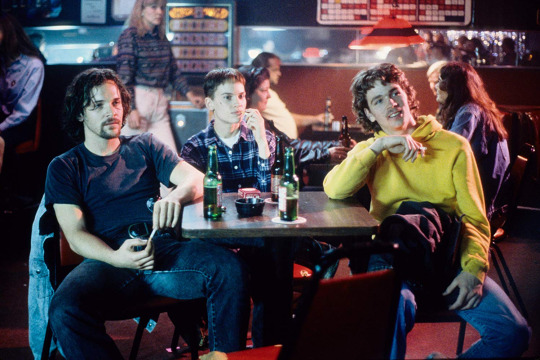
Either way, I did find it absolutely fascinating from a characterization standpoint what happened after Brandon was raped. Because before they get confirmation that Brandon is trans, they are using Brandon’s name and pronouns, then they get the confirmation and partway through they switch to Brandon’s deadname and misgender him. When they rape him, they misgender him. When he’s raped we see him getting thrown around, slammed against the car, punched in the face, etc. he is treated with such violence, and then it is over and Tom and John and Brandon kinda go back to normal? They gently place his shirt over his torso, they call him buddy, they help him stand up, they help him get in to the car, they ask Brandon if he is okay.
They take Brandon home, and immediately go back to affirming his identity. Like Brandon is in the bathroom, trying not to hold back or quiet down his breakdown, and John and Tom refer to him as ‘little dude’ when they start asking him if he is okay and if he will need any help. Like???? I feel like I will need to sit in that scene for a while trying to pick apart what John and Tom’s brains are doing there. Don’t get me wrong, the less I have to hear Brandon be deadnamed or misgendered the better, but it was truly a wild thing to see Brandon’s cousin deadname and misgender him all the time while still caring about and loving him, and to see Brandon’s assaulters and future murderers just slip so easily back in to masculine terminology for Brandon in this scene.
[Assault conversation over]
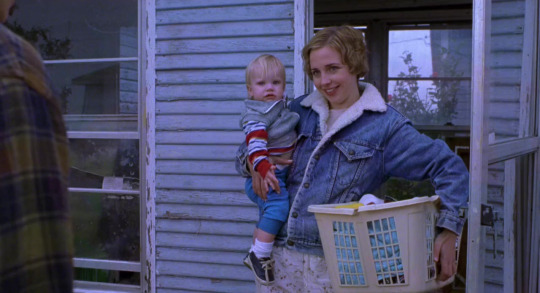
We get a similar thing with Candace where she is the first person to figure out that Brandon is trans, and she is horrified. But when Brandon comes a-knocking on her door, at first Candance cannot even meet his eye but she still uses his name, and the second she picks up on the fact that something is wrong with the way his voice wavers, she faces him, she softens, she asks him what they did to him, and she lets him back in to her home, she tries to hide him to keep him safe long enough to get out of town.
And Brandon gets another moment of peace, he and Lana have sex with Lana knowing everything about him. Knowing that he lied about his life, knowing that he has a vagina. They have another moment alone to dream, to talk about leaving Fall River, to plan to run away together. I don’t know if any of that happened in real life, but the movie at least grants Brandon one more moment of joy before his entire life is ripped away from him.

And it happens so fast. Candace is shot and killed instantaneously. Branon is shot in the head and he dies instantaneously, and John stabs him to make sure he’s finished the job, but in an instant, with the pull of a trigger Brandon is just…gone. Twenty-one years old, a whole life ahead of him. I think movies too often grant its characters a dying monologue. They get to have a final moment before they finally, slowly succumb to their injuries. But not here. Brandon is alive one second, and dead the next. There is no moment for silence right after, there is no remorse with John or Tom, they turn against Lana, they turn against each other. They are firing bullets at random, John is stopping Tom from killing Lana or Candace’s toddler.
I’ll tell you what though, sometimes the parallels parallel. Two days ago, my friend and I learned of the death of someone we cared about and loved, it’s a devastating loss for our household, and a devastating loss for the broader community. As far as I know, they did not die from any violent action, but they were a part of an incredibly stigmatized and disregarded community. The last few people who have passed away in my life died slowly, I was able to brace for it, but this was quick, unexpected and I say this only because seeing Brandon die so quickly, knowing he was real, knowing he had so much time taken from him, that knowledge just wrapped itself right around the rest of my grief for the week. I had a delayed emotional reaction to this movie, it took a couple minutes of silence afterwards to feel the blow, but I think having watched this when I did, Brandon Teena’s story will live in a different, deeper part of me than most of the films I’ve watched so far.
Favorite Moment

There isn’t one scene that really stands out to me, cause everything was so strong. I feel like my favorite moment is maybe right at the beginning when Brandon looks in the mirror after his haircut and sees himself and you can just see the happiness take root in his body.
Favorite Quote
“You’re so handsome”
Lana says this after she and Brandon have sex for the first time. I talked about it a bit above, but I think she figured out that Brandon was trans here, and I see her calling him handsome as affirmation.
Final Score
9/10
This was a fantastic film with incredible acting.
#bengiyo queer cinema syllabus#queer cinema syllabus#boys don't cry#boys don't cry (1999)#brandon teena#unit 4: heartbreak alley#apologies for skipping Strange Fruit y'all I went to watch it and I can't find it online so I will need to scour the library for a copy#i do hope I will be able to watch it#wka long post
31 notes
·
View notes
Text
Bengiyo's Queer Cinema Syllabus
Had a busy couple weeks, but here I am, returning to @bengiyo’s queer cinema syllabus. I am currently working my way through Unit 4: Heartbreak Alley, the totally light-hearted, definitely not agonizing section of the syllabus where I get to watch countless acts of violence be committed against queer people. Thank fuck I have Lesbians waiting for me at the end of this unit. The films in Unit 4 are: Bent (1997), Strange Fruit (2004), Boys Don’t Cry (1999), Brokeback Mountain (2005), Parting Glances (1986), Philadelphia (1993), The Living End (1992), Holding the Man (2015), Jeffery (1995), and Boys on the Side (1995).
Today I will be writing about
Strange Fruit (2004) dir. Kyle Schickner

[Run Time: 88 min, Available: had to purchase a DVD, Language: English]
Content Warning: lynching, racism, homophobia, rape, violence/gore
Summary: A New York attorney must return home to Louisiana to investigate the death of a childhood friend who, like Boyals himself, was both black and gay.
Cast:
Kyle Faulcon as William Boyals
Berlinda Tolbert as Emma Ayers
__
Well.
First of all, I guess, a thank you to @bengiyo is in order for discovering that Strange Fruit was available on DVD so that I was actually able to watch it. This has joined the likes of Mysterious Skin on my ‘definitely something I needed to watch, but can probably never watch again” list.
I want to warn anyone that is considering finding this film and watching it that it starts with a lynching. I…. I’m not sure I have the words. Not to get too real on main, but I have some pretty major trauma related to hangings, and I am just desperately glad that I did not watch this last week, as that was the anniversary and I am not confident I would have been able to finish this film. As it is I have been sitting in complete and utter silence since finishing the movie because a) holy shit b) the rope burns on his neck c) holy shit.
How do you watch a film like this knowing that lynchings still happen all the time? How do you watch a film where a gay Black man in a small, rural country town is brutally beaten, raped with a branch, and hung from a tree on screen while knowing that just last week a Black man was found hanging from a tree in a small, rural country town? For a movie that was filmed on a budget of only $250,000 (according to Wikipedia, the director was offered 6 million if he didn’t make the lead character both Black and gay and he turned it down) it is absolutely packed with very important, nuanced social commentary around queerness, around race, around homophobia in general and homophobia within the Black community specifically, around how the police uphold power, around the relationship between intellectualism and the South, and around how the queer community survives.

(sorry for the abysmal photo quality, there are no photos of this film and I watched it on my TV so I was not able to take screen shots)
For as cheaply as it was made it packs a motherfucking punch let me tell you, watching Kelvin scream for help, call for his mother, was just gut wrenching. Watching William desperately plead with the Black men who were lynching him not to do so because they were perpetuating the cycle of violence done by white men to black men not that long ago. How some Black men were fine with that because Kelvin, because William were faggots. How others killed themselves when the dust settled, understanding the realities of what they had done. The speech at the grocery story between Mrs. Ayers and Mrs. Boyals about how desperately Mrs. Ayers had wanted to disown Kelvin for being gay and how grateful she was that she hadn’t because she lost Kelvin too young.
The way small town loyalties and small town fears intersect, Matthew being so grateful that William protected him all the way back in fifth grade that he went against the orders of the other cops to tell William everything he knew, and how he was so afraid to be considered a homosexual if he stood up for a queer man. The way Sheriff Jensey was a racist, homophobic piece of flaming dog shit who still was doing everything he could to prevent people from knowing his nephew was gay. How he was reduced to ground meat for it. (Though, he can die, I have no remorse for him whatsoever). The way Mrs. Ayers calls out the fact that William can pass as straight but Kelvin couldn’t. The way that the queer community was silent in the wake of Kelvin’s death because that was the only way to guarantee the survival of community pillars. The fact that there was no new coverage of Kelvin’s death that we could see, but when the white man was lynched, there were news trucks all over the place because someone in power was affected.
And perhaps my favorite example, Duane, who refuses to step foot in a gay bar for fear of looking gay when he first starts investigating his brother’s murder with William who is ready to throw hands at Sheriff Jensey’s nephew when he makes a homophobic comment, putting his parole at risk, who ends the film driving around in William’s rental car which has the word Faggot spray painted on the back. The way he was angry at William for the stupid, elitist shit he was saying, about how everyone in Louisiana had an IQ below 80, how he refused to call this place his home anymore. Duance handled those moments so beautifully. There are so many important scenes in this film, I don’t think I can count this one as my favorite, but I do need to acknowledge how happy I was that Strange Fruit let a Black man cry on screen. Like, so much of Kelvin’s murder, and William’s attempted murder was incredibly upsetting, but I felt very deep in my soul the pain, the grief, the nausea that Duane must have been feeling looking at the memorial to his brother at his murder site.
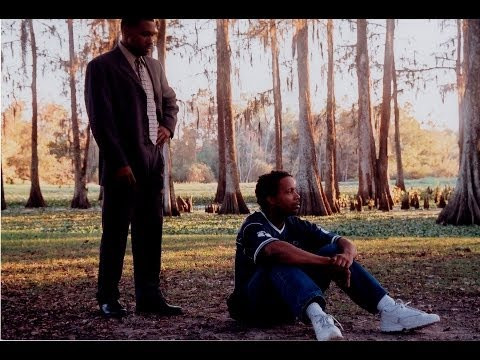
I know because (again to get too real) for every day for months after my hanging related trauma I had to walk past a memorial for the person who passed, and let me tell you that shit was fucking brutal.
There is so much more that could be said about this movie, but genuinely, I cannot find the words. The production team knew what they were doing when they didn’t put a backing track on the end credits, opting for a silence that was interrupted by only the chirping of crickets. Because that is what this movie is, that is what this movie does. I am not exaggerating when I say that the only thing I could do for thirty minutes after the screen went to black, was just sit on my couch, frozen, and feel the weight of the silence around me.
Favorite Moment
I talked about this a bit above but my favorite moment in Strange Fruit is when Mrs. Ayers and Mrs. Boyals run in to each other in the supermarket and Mrs. Ayers gives a very passive aggressively polite talking to to Mrs. Boyals about her homophobia, trying to get her to go back on her decision to disown William after finding out he was gay. I do think it is vitally important that we get a scene where a mother of a queer son, who just lost her child because of it, is able to admit that she struggled with his sexuality, that she desperately wanted to be rid of Kelvin, that she desperately wanted to forget he even existed. The way she was spared from having a major regret in her life because she ultimately did not do that. She lost Kelvin when he was too young, she understands at a cellular level the precious nature of time, and how easily it can be squandered and she is trying to spare Mrs. Boyals from that pain. I appreciate it strikes enough of a chord with Mrs. Boyals that she attempts to visit William at the hospital, even if ultimately she is not able to make it through the doorway to his room.
Favorite Quote
“See that’s the thing about the bayou, no matter how much you try to push it back ‘ventually it’s gonna claim what belong to it. This is where you from man. This is where home is. Don’t matter how many degrees you got, you country.”
As a Southerner who did flee North, Duane’s words are still ring true. Even when my home state wants to dispose of people like me, even when states I have called home express their hatred of people like me, there is still a part of me that feels the emptiness of being away from home. I miss the mangroves, I miss the mountains, I miss the food, I miss the people I love who love me. It feels impossible to have the type of community I had back home up where I am now, and I am trying as hard as I can to cultivate it. I just love this line so much because I think it is important to remember where you came from, especially because William just before this was insulting the intelligence of people in the South, his people, from his home. I’m really glad he apologized for that.
Score
8.5/10
If this was a grade based on just emotional manipulation, the film would get a 10 cause...fuck. But structurally I think it's probably like a 7 or an 8 so I am gonna give it an 8.5.
#bengiyo queer cinema syllabus#bengiyo queer media syllabus#queer cinema syllabus#strange fruit#strange fruit (2004)#strange fruit the movie#unit 4: heartbreak alley
22 notes
·
View notes
Text
Bengiyo's Queer Cinema Syllabus
For those who are not aware, I have decided to run the gauntlet of @bengiyo’s Queer Cinema Syllabus and have officially started Unit 2: Race, Disability, and Class. The films in Unit 2 are: The Way He Looks (2014), Being 17 (2016), Naz and Maalik (2015), The Obituary of Tunde Johnson (2019), Margarita With a Straw (2014), My Beautiful Laundrette (1985), Brother to Brother (2004), and Beautiful Thing (1996)
Today I will be writing about
Naz and Maalik (2015) dir. Jay Dockendorf
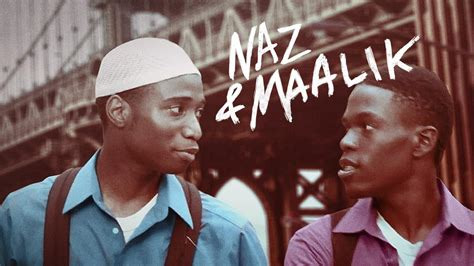
[Available on Amazon, Run Time- 1:24, Language: English]
Summary:
Two closeted Muslim teens hawk goods across Brooklyn and struggle to come clean about their sexuality, as their secretive behavior leads them unknowingly into the cross-hairs of the War on Terror.
Cast:
Kerwin Johnson Jr. as Naz
Curtiss Cook Jr. as Maalik
__
Another great film down, and plenty more to go. I very deeply appreciate the authenticity of this film in the way it highlights religion and the shittiness of cops.
I like that there is a kind of war against the older ways and the newer ways between Naz and Maaling. Naz appears to be much more religious than Maalik, he wears a kufi, he gives alms, he tries to pray five times a day. Not to say that Maalik isn’t religious, but he isn’t as hung up on what is and is not haram, he’s more comfortable in his sexuality, more willing to engage in PDA, but he’s less idealistic about the world.
I love the hustle and grind we see from these boys, but even more so I love when they spend time alone together. I love how much time we get to see them goofing off, touching shoulders, flirting, racing, just having fun. I love how much time this film dedicates to showing how Naz and Maalik’s relationship works. How it could work. I love that in New York City they have so many shots dedicated to just the two of them, to the peace and quiet and light that follows them when they are together.
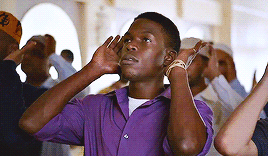
I love even more that they fight, that they are messy and complicated, and how much of that is driven not by themselves, but everyone else around them. This film takes place post 9/11, during the War on Terror. For those who are not aware, the War on Terror is/was a global counterterrorism military campaign following 9/11. And like I said, this film does some pretty decent realism, especially when it comes to the portrayal of the FBI agents that spend all day tailing Naz and Maalik because they have been #profiled.
One of the main conflicts kicks off when an undercover cop tries to sell Naz and Maalik a gun. Maalik, trying to be funny, haggles for the weapon but does not end up buying it. But engaging in a joke like that is enough for this FBI agent to decide they should be followed. At which point, these two FBI agents essentially end up acting as voyeurs to Naz and Maalik’s secret love life.
The FBI waits until each boy is alone and isolated to question them, and Maalik is completely honest while Naz, scared about his parents finding out about his sexuality, lies about where he had been the night before. Once again, I loved the portrayal of this, of two eighteen-year olds trying to navigate the system that was built to punish them. Not because I’m thrilled they are being harassed, but because I am appreciative of not being subject to propaganda about law enforcement and how “good” they are.

I liked seeing the dichotomy between Naz and Maalik’s handling of the FBI agent, versus an older Black man handling questioning. How he’s trying his best not to give her any information, how he cites his right to not say anything to her without an attorney present. And in response he is treated with suspicion, the FBI agent tries pressing and pushing for more information, because that’s what cops do.
And I remain unsurprised when the FBI agent pulls a gun on Naz when he reaches in to his bag. I think there are statements being made when the FBI agent is pissed at Naz and Maalik for “wasting her time” and that the boys are compelled to apologize for the inconvenience, despite the fact they were literally just existing as Black muslims and the FBI agent decided that not buying a gun was enough of a reason to tail them all day.
But it is those outside pressures, the concern that they will be outed, that they will be disowned, that they will lose everything that starts driving a wedge between Naz and Maalik. That Naz’s sister finds out and Naz is scared she’ll tell their parents. Those all start when the FBI starts questioning them, though there are multiple other forces at play.
Now. I think I wrote up a post after I watched Love of Siam, and how fucking furious I was that they ended that film on a separation. But that does not mean I hate separation narratives in queer cinema (I hated the one in LoS because I felt tricked). But Naz and Maalik separating at the end makes sense given their circumstances. There is no winning here. Naz is too kind to slaughter a chicken, Maalik feels compelled to show that he can do it, and Maalik ends up wounded and the chicken ends up dead without either of them laying a hand on it. There are repercussions here, a car accident, an injured person that could have been spared by just killing the chicken. I like that despite the fact that Naz and Maalik do have multiple fights in the film, it is not a fight that breaks them up.

They both knew this was an inevitability, there aren’t hard feelings about it. It’s sad for both of them, but it happens almost casually. TI did find the ending of the movie very interesting. Because they chose to end it before Naz arrives home. Naz gets on the subway, sad about his separation with Maalik, scared about what is waiting for him at home, and he is stopped by the very same cop that tried to sell him a gun the other day. He is ticketed for riding his bike in the subway, and one of the last lines Naz has in the movie is something like “don’t I know you from somewhere?”
Because no matter what, he’ll just never catch a fucking break.
As an aside, I love how frequently homeless people are included in this film and how they are never regarded as scary or terrifying. One guy is mostly quiet and he either stares or sleeps. Another man is loud, rambunctious, and fucking funny. Naz and Maalik talk to a homeless woman, talk to some boys begging for money for medical treatment. I just love when homeless people are humanized, and I am glad that Naz and Maalik spends time focusing their lens on the people society often refuses to look at.
By/For/About Queers

Naz and Maalik is loosely based on an interview director Jay Dockendorf did with a closeted Muslim man that he sublet a room from. Dockendorf used this man’s life story as a jumping off point for his film. And it certainly feels like a film that is made for queer people, the way that it is structured. So ultimately, I think this is a gay trifecta.
Favorite Moment

My favorite moment is near the end of the film. Naz and Maalik have just made out and Naz has rejected the offer to take things further. Naz and Maalik lay in bed together, in just their boxers, and they read each other these shitty little poems that are attached to beanie babies that Naz acquired earlier in the film. I just love gay boys and their plushies, I’m a simple person. And once again considering that Ben created this syllabus to be a wind up to BLs, I think the plushie moment is worth noting because boys and their plushies is a recurring theme in a number of BLs. Teh and Oh have matching monster plushies in I Told Sunset About You. Bai Lang’s entire apartment is covered in plushies in My Tooth Your Love. Chinzilla keeps a plushie of a chinchilla on an alter in the music room in My School President. etc. etc.
And I love plushies every time because I love seeing moments of softness portrayed on screen.
Favorite Line
“Barack Obama*. It’s crazy. It makes white men smell like black men, so white women will like black men more.”
*fake name of a scented oil
I mean…come on. It’s perfect.
Score
8.5/10
I think the story was pretty good, and there are these incredible bright spots of powerful acting. But the director allowed space for a lot of improv, which in some capacities I think is good. However, it does often result in awkward line deliveries, that tend to take me out of the story because the acting fluctuates so much between brilliant and smooth, to conscious and stilted.
#bengiyo queer cinema syllabus#queer cinema syllabus#naz and maalik#naz & maalik#jay dockendorf#the way he looks#being 17#the obituary of tunde johnson#margarita with a straw#my beautiful laundrette#brother to brother#beautiful thing
48 notes
·
View notes
Text
Bengiyo Queer Cinema Syllabus
For those who are not aware, I have decided to run the gauntlet of @bengiyo’s Queer Cinema Syllabus and have officially started Unit 3: Faith and Religion. The films in Unit 3 are: But I’m a Cheerleader (2000), Prayers for Bobby (2009), Latter Days (2003), Blackbird (2014), The Wise Kids (2011), Henry Gamble’s Birthday Party (2015)
Today I will be writing about
Latter Days (2003) dir. C. Jay Cox
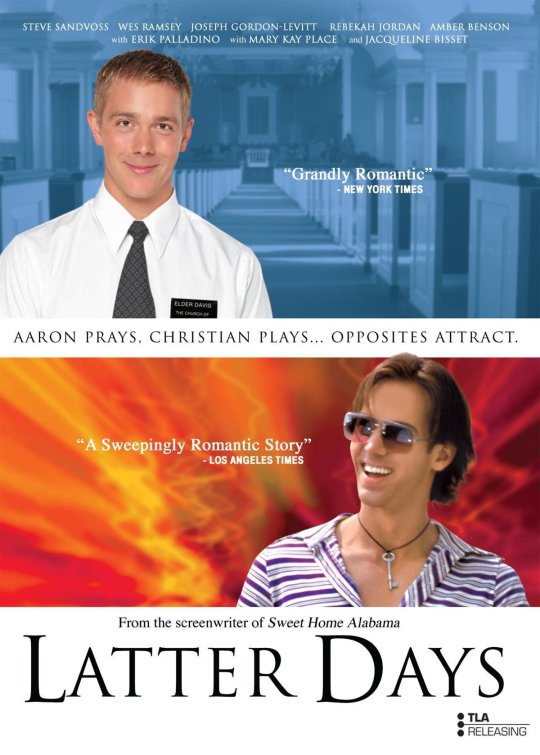
[Run Time: 1:48 , Available: tubi, youtube premium, amazon but you have to get a free trial to something else…I tried watching it…somewhere else but they were updating the movie so I caved and went to tubi, Lang: English]
Summary: Latter Days is a 2003 American romantic comedy-drama film about a gay relationship between a closeted Mormon missionary and his openly gay neighbor. (from wiki)
Cast:
* Wes Ramsey as Christian Markelli
* Steve Sandvoss as Elder Aaron Davis
___
Content Warnings because I don't really write about those parts of the movie here: this film gets to a dark place, it includes self harm/a suicide attempt, homophobia, medical torture, and a story about being left to die by a parent.
Alright, so after sufficiently crying my eyes out binging Eternal Yesterday, I decided there was enough time in the evening to knock out another film from the syllabus. Today’s film was (partially) about Mormons and Mormonism. My own personal understanding of Mormonism does not extend too far beyond The Book of Mormon: The Musical. Which gave me some impression that homosexuality is a sin, but only if acted upon.
Which, is gonna suck for our poor dear Elder Davis, when he and three other Elders roll in to Los Angeles and in to a house across from our beloved booty shorts wearing waiter. The movie seems pretty low budget, and it’s from 2003 so there are some, what I would call cheesy camera effects happening at the beginning, but I still enjoyed the way the world seemed sped up and disorienting when Mr. Mormon lands in Los Angeles from his home in Idaho.
I love our introduction to Christian as an unapologetically queer, slutty man and not only that, but Christian has his sex life together. He remembers who he has slept with, and when, and takes fucking notes and everything. Like, he’s truly impressive.
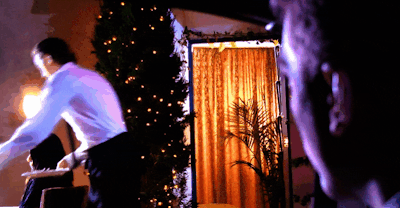
gif from @bl-bam-beyond
Aaron and Christian make eye contact as every love at first sight story is wont to do, and then realize later they are neighbors. At which point a lot of decently subtle things start to happen. Aaron starts sitting outside to study his scripture in hopes of running in to Christian, Aaron and Christian talk about his mission trip, we get to see the four Elders interact, etc. and these subtler moments were aspects of this film that I deeply appreciated.
Do not get me wrong, this film is absolutely critical of the Mormon church, (there is a scene near the end of the film where Elder Davis is getting excommunicated from the church for being a homosexual), but there are a lot of quite parts they do not say out loud around the intentional isolation that The Church of Latter Day Saints creates by sending their boys on missions trips in the first place.
This film does not, in my opinion, explicitly discuss or state that mission trips really seem to be less to recruit new members and more to make sure their younger members don’t go running off to join the rest of society. The Elders are not allowed to see their family for two years, their families are not allowed to see them, they are not allowed to listen to music, to watch television, all the Elders in that location live together in one house, they share a room so there is no privacy, they go knocking door to door to try to spread the word only to have the doors slammed repeatedly in their face. These tactics exist to make these boys homesick, to make the outer world seem hostile, to bring the Mormon roommates closer together when the outsiders push them away. But the implication is there.
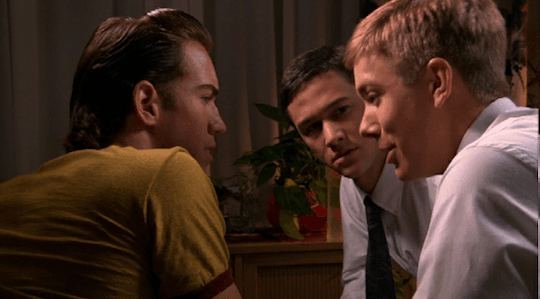
I have to share the quote that comes with this gif: "You're gonna come in to my house and tell me God hates homosexuals?" || "And the French!"
And actually, the thing I appreciate the most about this commentary is the fact that the Elders are aware of this, and that they are allowed to be young men. I loved that one Elder was talking to Aaron about how mission trips were designed to be difficult, and that you can tell he is generally disinterested in spreading The Word. This Elder views his mission trip as the last major hoop he has to jump through before he can marry his girlfriend and “finally nail her”. Horniness fuels his motivation to get through this mission.
These “Elders” (and I put quotes here not to strip them of their titles but to point out the irony) are nineteen or twenty years old. They are fucking gross. Their apartment is decorated like boys live there, with bean bag chairs and all, and they fart on each other, and wrestle, and bite their bedframes to try to stop themselves from jerking off. Hell, when they first move in, Christian mistakes them for a frat house. They are homophobic, and throw slurs around, but they look incredulous at the mere thought of consuming alcohol.
The first time Aaron is faced with the potential to give in to his gay thoughts, he tells Christian he hasn’t done anything. When Christian says it doesn’t have to mean anything and Aaron says “yes it does”, he asks “my first time can just be a little fun for you?” like Aaron was fully planning on having sex with Christian. I like that Aaron, as a young man is going 0 to 100 with the physical intimacy.
I often have difficulty with romance stories in movie formats because I have to push past how quickly two characters fall in love. Which is the case here that Christian is confessing his love for Aaron after they have interacted like…five times total. But, I appreciate the ways they show us that Christian and Aarong would be good for each other. We see them being absolute nerds, saying movie quotes to each other. I love that we know Aaron is going to break the rules and eventually give in to Christian, just based on the fact that he gives Christian his first name. Which he is not supposed to use when he’s on his mission trip.
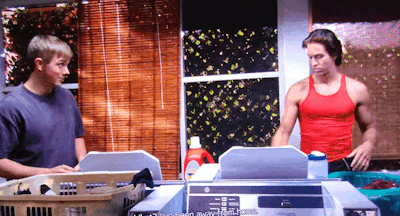
gif from @bl-bam-beyond
I am not a religious person, so I don’t usually pay attention to whether or not a film that critics religion is going to take a hard atheistic turn or not. But I actually thought it was compassionate, kind, and in keeping with the nature of like, religion as spirituality, versus religion as control and fear tactic. I like that all these little coincidences happened, that Christian saw Aaron through his taxi cab window, that Aaron talked to and comforted Lila (Christians’ boss) when she was having a bad day and she gave him her card and told him to come to her restaurant for a free meal, that when Christian is looking for Aaron his random doodles end up being the phone number he needs to call, that Julie in stealing entries from Christian’s diary for her song allowed Aaron to hear it in the facility his parents put him in and return to LA, and that Aaron and Christian were reunited because Aaron cashed in on that free meal from Lila.
And so too with the man Christian meets who is dying of AIDS, how he touches him and only sees snow. How he chalks that up to Christian being a blank person, shallow. The same way that Aaron has described Christian “there is nothing, nothing about you, Christian that isn’t skin deep”. And how we see Christian recoil from the touch, from the words ‘snow’ (and we will come to find out later, why that is the case).
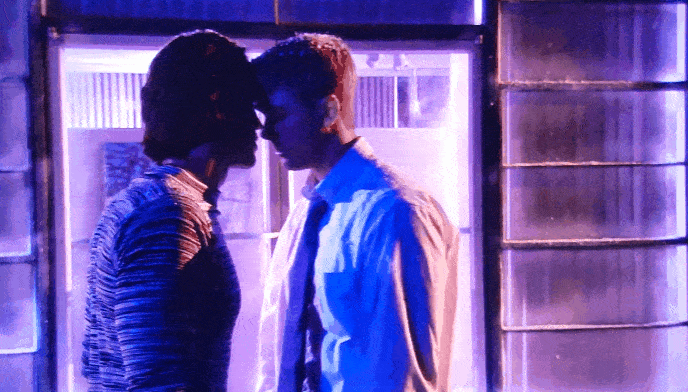
Like these can all be coincidences, or they could be chalked up to fate, or a higher power, or whatever you want. Latter Days does not reject the idea of religion, it leaves room for a religious, higher power explanation to exist. Aaron and Aaron’s faith, the way he views the world, the importance that his values hold to him do still impact Christian. I don’t know how much he believes in God, but when Aaron calls him shallow, he takes that to heart, he really thinks about it, he realizes that what has been drawing him to Aaron is the depth, the conversations, they aren’t just gonna fuck.
Not that I think monogamy needs to happen, or that Christian needs to have calmed down the sluttiness. Just, that in a film about religion and its intersections with sexuality, when you are going to be critical of a Church that has done very very real harm. That there is a mutual exchange here. Christian gets more depth as a result of meeting Aaron and Aaron (eventually) gets freedom as a result of meeting Christian.
BL Side Note

I also need to say, since this syllabus is technically supposed to act as a lead up to BLs, that Latter Days has the sponge bath trope! Aaron wipes down Christian’s body with a washcloth after he faints from seeing blood. The sexual tension rises between Aaron and Christian, until they are about a fraction of a second away from kissing, and Aaron bails.
For/By/About
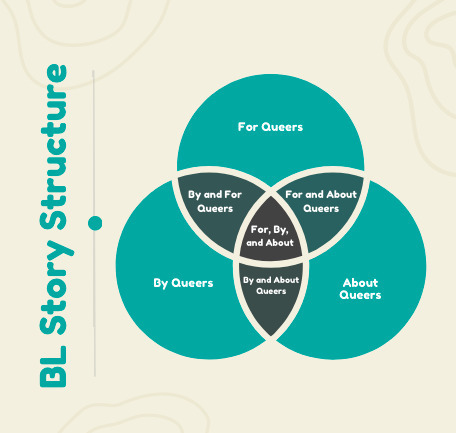
Gay Trifecta.
The director of Latter Days, C. Jay Cox is a gay man and a (former) fifth generation Mormon.
This film did not hit me in the emotional place where I would normally say the films I rate as For The Queers go. But, this is a deeply personal film for the screen writer and Director who is gay and therefore it feels like it should be for gays. And, in addition I feel like they were enough casual references to things that don’t get full explanations that would read and be understood by a queer audience but maybe not by a straight audience. I think there are dimensional portrayals of the queer characters and they don’t succumb to stereotypes, and for those reasons I would categorize it as being for us.
Favorite Moment
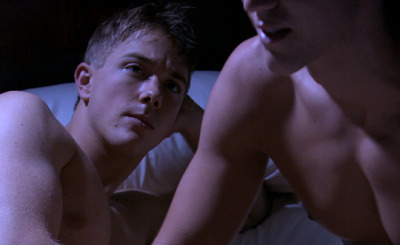
The post-sex conversation that Aaron and Christian have, where Aaron asks if Christian has ever had the experience of being cut off from everything, and we finally get some more of Christian’s backstory. Now, like I said above, there are some understated aspects of this film that I do think are really smart. Aaron calls Christian shallow at one point, and my first thought was “oh honey, you are wrong” because of how Christian spoke to Aaron earlier on in the movie about being desperate to get away from home. Sure, Christian is generally now, emotionally reserved and has some growing to do. But, Aaron vastly underestimates the weight behind a gay man saying that he left home and never looked back. Because Aaron had a good relationship to his family (before he came out).
If the monologue wasn’t multiple paragraphs I would probably put the whole speech as my favorite quote. But, fundamentally what makes this scene for me is that Christian is telling Aaron this, while they are both naked in bed. Aaron has just had sex for the first time, and there is just this level of casual inclusion of nudity. I am generally an advocate for increasing the inclusion of non-sexual nudity on screen. I feel like people tend to spend a lot more causal time naked than they do sexual time naked, and I think Latter Days did a really phenomenal job of shifting between sexual nudity and casual nudity in the same setting, with the same characters, at the same time.

When Aaron and Christian first enter the airport hotel, they are shedding their clothing with the intention of having sex. The scene is charged with sexual tension, shirts and pants are coming off as fast as they can, every movement brings them closer to the bed. But after they are done, Aaron, still naked, slides across Christian’s naked body to grab a watch off the floor, and Christian holds his leg so he won’t slide off the bed. It’s just comfortable. When Christian is talking to Aaron about his experience of being left in a snowstorm by his father, they are nude because they are being laid bare. I don’t know if I can describe it properly, but I just love that this really important conversation, where Aaron is learning that Christian understands far far better than Aaron ever could have thought about what you risk losing when you are queer, happens with literally everything out in the open.
Favorite Quote
“It’s early November, the same as now, and there's this storm rolling in. My dad was so determined that sissy boy was going to kill something. Snow came at us from all sides. The air, the sky, the ground they all became the same and horrible screaming white and I thought ‘we’re gonna be OK, right?” And then I saw my father’s eyes and they were that same white…and that’s when he did it.”
“He did what?”
“Ran.”
This quote comes from part of the monologue I mentioned in my Favorite Scene.
Score
8/10
Latter Days is an 8/10 for me for a few reasons, the acting was not always the best, it was clear they did not have either the time or the budget for perfection. There were stutters that read far more like actors forgetting their lines than they did like natural pauses. I also was not thrilled with the death fake out. Like, I am very much glad we did not see Aaron self-harm, and that some of the other torture he went through gets dampened a bit by dream sequence shenanigans. I figured that they were not actually going to kill Aaron off, but they do spend quite a lot of time letting the audience think he is dead, and I am not super appreciative of that.

#queer cinema syllabus#bengiyo queer cinema syllabus#latter days#latter days (2003)#unit 3#unit 3: faith and religion
49 notes
·
View notes
Text
Bengiyo's Queer Cinema Syllabus
Hello! After a holiday hiatus, I am returning to @bengiyo’s queer cinema syllabus. We will be ringing in the new year with Unit 4: Heartbreak Alley, the totally light-hearted, definitely not agonizing section of the syllabus where I get to watch countless acts of violence be committed against queer people. That fuck I have Lesbians waiting for me at the end of this unit. The films in Unit 4 are: Bent (1997), Strange Fruit (2004), Boys Don’t Cry (1999), Brokeback Mountain (2005), Parting Glances (1986), Philadelphia (1993), The Living End (1992), Holding the Man (2015), Jeffery (1995), and Boys on the Side (1995)
Today I will be writing about
Bent (1997) dir. Sean Mathias

[Run Time- 1:45, Available: tubi, for rent, Lang: Eng]
Content Warning: Holocaust, torture, murder, suicide, references to necrophilia
Summary: Max is gay and as such is sent to Dachau concentration camp under the Nazi regime. He tries to deny he is gay, and gets a yellow label (the one for Jews) instead of pink (the one for gays). In camp, he falls in love with fellow prisoner Horst, who wears his pink label with pride.
Cast:
Lothaire Bluteau as Horst
Clive Owen as Max
__
Well. This was a fascinating watch. For Unit 4 the only film I’ve seen prior is Brokeback Mountain and I feel like Bent had a similar structure in that the most emotionally difficult parts are primarily (not fully, rest in peace Randy and unnamed girl) towards the end. I definitely went in to this movie expecting it to be jam packed with pain and suffering in a way that would constantly assault my emotional space, but that wasn’t what it was. And it felt all the more realistic for it, I think.

We open at Greta’s club, we got an outright bacchanal, such a beautiful, vibrant, explicitly queer space…in Nazi Germany. And it eases you in to that concept because the first party we see is completely absent of any soldiers, then we get soldiers coming in to join the fun, and then we get Nazi’s coming in looking for one particular person, and Max’s boyfriend Randy watches the Nazi’s slit Wolf’s throat. This was an interesting choice in name for me, because Hitler really wanted to be called Wolf, and made people refer to him as such. Anyway, Wolf dies, Max and Randy run to Greta’s home which is…literally a home made out of wardrobes (living in the closet), and Greta dresses them all up in suits and burns all the evidence of her queerness. And you’d think they’d be laying low, which in some ways they are, yet they are at fully discussing what happened, aligning themselves with queerness, on a public bus, in Nazi occupied Berlin, after literally just escaping Nazi’s as if it’s a regular day, and they haven’t just watched someone get killed for being queer.
And nonchalantly, Greta strips away all of her identity, she’s got things figured out, she becomes Greg (or something) and starts talking about the wife and kids he has at home, and how he’s fucked every sex worker on the street, and that’s it (“So queer is out. Queer is dead. Ratatattat”). They don’t seem phased, they don’t seem scared, Greta processes the grief they know is coming for them while they sing farewell songs in their own club, and that’s it. They give Max and Randy enough money to flee Berlin, and we never hear about them again. And when I talk about the realism in this, I mean that Randy, having just watched a man be murdered, doesn’t want to leave Berlin, because he put money down on a dance class and he doesn’t want to miss those classes. And it strikes me that Max constantly seems annoyed with, fed up with Randy, and yet cannot leave him, just as Randy cannot leave Max. Randy and Max both had an opportunity to leave each other, and get away to safety, and they stayed together, and that was their downfall.

But before their capture, we see them just like…waiting around, they are getting on each other’s nerves, they are bickering about cheese. Again, it feels so…true to life? I don’t think we really think enough about the downtime when you are waiting to die, when you are hiding, when you are trying to survive. They have time to work, to gaze at the sky, to talk over a fire, to kiss, to sing, to accuse their partner of trying to poison their cheese. They have time to trust, to make mistakes, and to die.
Max was stupid, Randy was stupid, everyone made one mistake and now Max is killing Randy on a train to Dachau in a desperate attempt to prove to the Nazi’s that he didn’t know Randy, that he isn’t queer, just in the hopes that he will survive the trip to the camps. And this film does not shy away from the monstrosities/atrocities. They make you see Randy’s beaten body, knowing that the Nazi’s tortured him because he wore glasses and they thought he was an intellectual. When he was a dancer, which to be fair is just as much of a threat to the Nazi regime as anything else.
We have to just sit there, and watch Max tell himself over and over and over and over again “this isn’t happening. This isn’t happening. This is happening.” while Randy sobs in agony in the background.
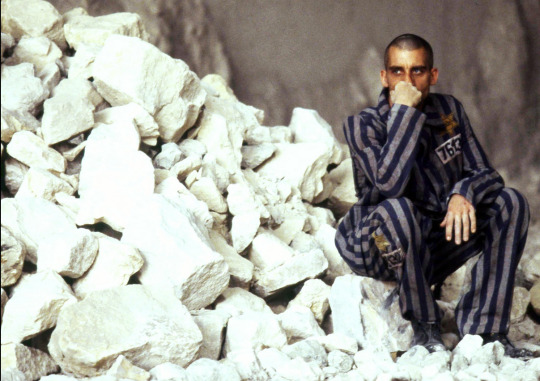
Which felt real to me too, because what else are you going to do? Horst has clocked Max, and has told Max that this train ride is made to break people, and personally I think Max was broken before Horst was even able to offer advice, but the only way he is even remotely capable of handling anything that happened on that train is to just willfully refuse to admit that it was real. It cannot be real. With the genocide in Gaza, I have really been thinking a lot about how suddenly life can change, I think about what it would be like if I were there, in that situation, or if it happened here and how I would react to it. And I do not know how long it would take for me to feel like any of that was real.
This movie was fascinating because so much and so little happens. We have the glitz and glamor, we have the frenzied escape, and then they sit in the woods, we have the train ride where Randy is tortured by Nazi’s and killed by Max’s hand, and Max is forced to rape the corpse of a 13 year old girl the Nazi’s shot, in order to prove that he isn’t queer, and then for the next hour he’s moving rocks back and forth, back and forth, back and forth, until we reach the last 5-10 minutes of the movie.
It was so interesting for me to watch this movie, seeing Max’s cyclical nature from beginning to end. At the beginning of Bent, Max is not hiding his queerness in any way. He’s at the club every night, he’s shoving his tongue down multiple people’s throats, he’s having public sex. He’s super. fucking. gay. He’s gone to all the clubs, he’s known in the community, his family knows he’s queer. It was an identity he held, until the second Horst told him being queer was the lowest of the low in the camps. For the majority of the time he was in Dachau he vehemently refused to wear the pink triangle, he convinced the SS soldiers to mark him with the Star of David and not the pink triangle by doing some truly heinous actions.
Max used his wealth and his willingness to do terrible things to get into a position he felt was safe. He moved rocks back and forth all day long and bribed the guards to let Horst move rocks with him. They were able to be together, to share space together, to imagine for three minutes every few hours that they were able to be together. To fuck each other, to love each other, to hold each other, but there is not allowed to be gentleness between them.
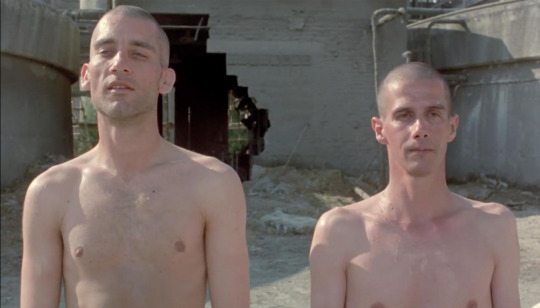
I loved the moments in this movie where Max and Horst were having sex with each other on those breaks. I loved that they were able to find a moment of pleasure. I loved that Horst was allowed to cry, to beg for gentleness, I loved what it said about Max that he said he liked to be hurt in sex, that it was exciting. I am absolutely not one to judge that, let me preface, but it felt to me Max is trying to believe about himself but isn’t true. If he likes being hurt, maybe he can cope better with the pain he is experiencing.
And again, in case people have forgotten the overall purpose of the syllabus, Ben structured these units to slowly progress people in to BL. So I want to relate a moment of this to BL a little bit because some of it made me start thinking of The Eclipse, mostly around the conversation Horst and Max have about the SS soldier who is “the worst in the camp” and whether or not he’s queer. Which leads to one of the most important lines in the film, for me anyway:
Max: “Of course he could be queer. But you don’t want to think about that. You don’t want them to be”
Horst: “There are queer Nazi, and queer saints, and- and queer geniuses, and queer nobodies.”
This film is about what people do to survive, the cycles they maintain, the parts of them they break, in order to live to the end. And this moment made me think of The Eclipse in terms of the commentary that show also made about the harm oppressed groups can perpetuate against their own communities for the sake of survival, self hatred, etc. Chadok was authoritarian and militant and brainwashed Akk in to literally committing crimes to maintain order (shout out to the car Akk let roll in to a crowd of protestors) and was also a gay man trying desperately to hold on to his own safety after Dika died. We do not get a backstory on the SS soldier, nor would I have particularly cared for one, but we do know that every time certain soldiers enact physical violence against queer people, we see them wipe their eye as if brushing away a tear. We do know that that SS soldier made Max go down on him in order to get medicine. And at the end of the day it doesn’t fully matter if we get confirmation about that particular soldier, because the fact remains that there were queer Nazi’s and we have to reckon with that.

Max is maybe able to pass as straight, not to other queers, but probably to most of the Nazi’s and he says as much in his conversation with Horst about how the SS soldier would have killed him if he knew a queer had gone down on him. And ultimately I think it’s true, because that SS soldier realizes that Max went down on him for medicine, not for himself but for Horst, and that was all he needed to realize that there was more to the relationship between Max and Horst and to punish Max for it. It came as no surprise to me that the film would end with both of them dead, they spoke too often of survival, I loved so much that Horst, knowing he would die either way, decided to rebel for once and left a mark on that SS soldier.
Favorite Moment

So I think my actual favorite moment is the second time that Horst and Max verbally fuck eachother and we get the conversation about Horst wanting to be handled gently, but honestly I have to give a shoutout to the moment that Randy and Max are arguing in the forest because it feels like an organic conversation between a couple that has been stuck together in too small a space (read: a metal barrel for a roof over their head) and are under a lot of stress. And they’re just sitting there arguing about the correct term for the type of ecosystem they are in (“Forest”, “Jungle”, “Forest”) and Randy says he’s worried that Max poisoned the cheese (that Randy bought and selected himself) and the incredulity by which Max responds: “It’s your cheese..choke on it. I cannot tell you how much I want you to choke on it. Christ!”
I really loved all these types of little moments, the repetition, the tiffs, I felt like it really helped ground the film.
Favorite Quote

“If I can stand at attention they’ll let me hold you. I never held you before. I won’t let you drop. You know what? Horst? You know what? I think- I think I love you. Shh. Don’t tell anyone. Don’t worry about the rocks. I won’t drop you, I promise. I think- I think I love- Can’t remember his name. A dancer. I think I loved him too. Don’t be jealous. You’re safe. I won’t drop you. I love you. What’s wrong with that?”
Now, I will say, as much as my stomach twisted in horror at certain moments in the film, I was holding it together pretty well, right up until the very end. Max is commanded by the SS soldier to get rid of Horst’s body and as Max is lifting Horst in to his arms, the horns go off for their three minute rest where they are supposed to stand at attention. And Max…screams, he just screams “No” because he doesn’t want to let Horst go. He does not want Horst to drop to the ground. And the Nazi’s have already walked away, and so Max holds Horst as best as he can. This unmoving dead weight heavy and slipping in his arms. And for the first time ever he is able to hold this man that he loves. And then he drags Horst’s body to the grave, takes Horst’s shirt with the pink triangle, puts it on, and kills himself. It’s tragic, and horrible, and painful to watch but it was a moment of gentleness out of a man who had convinced himself he was a terrible person. And there is something to Max’s final moments being holding the man he loved who he’d promised would be safe in his arms, keeping that promise, and reclaiming his identity the way Horst would have wanted him to. He died a queer and he died on his own terms, and it fucking sucks that we don’t always survive, but I think Bent really sets itself up for the question of what it means and what it’s worth to be yourself. Because for us, as with many other people, to be ourselves can mean danger, can mean violence, can mean death and knowing that there are people who hide to survive still suffering under the constraints of closet life and there are people who step out in the open knowing what they might face.
Score
9/10
This may sound a little bit sadistic, but I think I wanted a touch more queer pain, and I don’t think this is a film that is easy to recommend to people because of how much of the movie is dedicated to repetition. This was a very strong film, the acting was great, and the sets were intriguing, and the little eyebrow touch did in fact come back to haunt me.
Next on the docket...Strange Fruit
25 notes
·
View notes
Text
Bengiyo's Queer Media Syllabus
For those who are not aware, I have decided to run the gauntlet of @bengiyo’s Queer Cinema Syllabus and have officially started Unit 1: Coming of Age Post Moonlight. The films in Unit 1 are Pariah (2011), Get Real (1998), Edge of Seventeen (1998), My Own Private Idaho (1991), and Mysterious Skin (2004)
Today I will be writing about
My Own Private Idaho (1991) dir. Gus Van Sant
[Available for rent on: Amazon, YouTube. Run Time- 1:44]
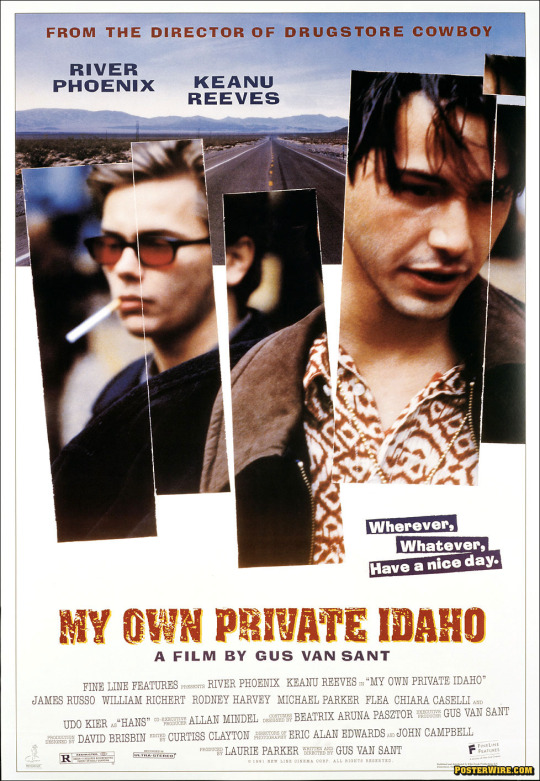
Summary: In this loose adaptation of Shakespeare's "Henry IV," Mike Waters is a gay hustler afflicted with narcolepsy. Scott Favor is the rebellious son of a mayor. Together, the two travel from Portland, Oregon to Idaho and finally to the coast of Italy in a quest to find Mike's estranged mother. Along the way they turn tricks for money and drugs, eventually attracting the attention of a wealthy benefactor and sexual deviant. (from Just Watch)
Cast:
River Phoenix as Mike a homeless queer male sex worker with narcolepsy
Keanu Reeves as Scott the mayor’s son, “homeless” sex worker who is friends with Mike
William Richert as Bob, I don’t have any other way to describe him besides this character is Falstaff in Henry IV.
Content Warning: mentions of sexual assault, prostitution, conversations around incest. homelessness.
So the first thing before we start, if you are planning on watching this film you have to remember this is based on Henry IV by Shakespeare. Because if you forget that (like I did until about 40 minutes in) there is going to be dialogue that makes you go “no one talks like this?????” (which honestly was not a bad thing, but remembering that it was Shakespeare did stop me from going down way too deep a rabbit hole about reality and unreality so…thank you brain! Now, unfortunately, I have not read Henry IV and also unfortunately I will not read Henry IV for the sake of being better able to analyze this film.
In hindsight, Scott is a dick and the film so perfectly sets up/foreshadows how we are going to get to where we end up with Scott, but as it is happening, it feels like a massive, unexpected punch in the gut the second you see him back from Italy, in a nice suit, in a nice car, driving blindly past his old pal Mike, who is collapsed in a sleep attack on the sidewalk.
I always love when media humanizes homeless, drug user, and sex worker communities so for me watching this film, that was a huge win. Unhoused folk, drug users, and sex workers are so fucking dehumanized in my society, and frequently blamed for their own life conditions, and considering the statistics on how many homeless people in the US are queer, and particularly how many queer youth are on the streets, it is particularly important to me that film, queer film especially, allows its audience to love, root for, and mourn for homeless queer people.
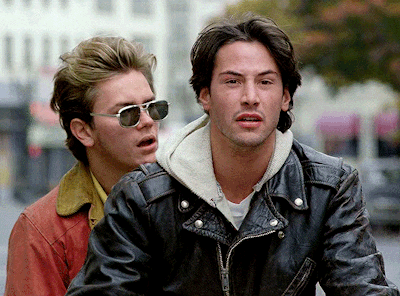
Gif by @camyfilms
I like that you don't really know exactly how Mike got to where he is. But there is enough context with the flashbacks we get and his medical condition to understand any number of ways that Mike ends up unhoused. I think it is particularly notable that there are multiple moments in the film where a house or other form of stable shelter is destroyed in his mind. Where I appreciate not really know exactly how Mike became homeless, because in a way it feels like his entire life was set up so that was the only inevitable outcome. Scott, however, I have no idea how he got to where he is, homeless and doing sex work, when he is set to inherit his father’s fortune soon.
And looking back at how the entire story plays out, knowing that Scott will eventually abandon Mike to pursue a love interest and wealth, it makes a lot more sense as to why we never truly find out how he got there. Because for Scott, it doesn’t fucking matter. Because for Scott, he is playing at being homeless. This is a funny little game for him, he can give a middle finger to his father and act out, and struggle for as long as it is entertaining and fun, knowing that at any point he can return home, shape up his behavior, and have more money then he knows what to do with.
Which is why I am truly and deeply obsessed with the fact that Scott wears a suit when he is amongst the other unhoused folk he is living with. Because of how much that visually separates him. I like that it is serving as a reminder of his status and almost like a reminder to himself that he is actually separate from everyone else here. And this theme is repeated in how Scott interacts with his father too. Because, while he wears a suit when amongst the unhoused, when he is summoned before his father, he dresses with a collar, and denim jacket without a shirt on underneath. Visually he looks a lot more like the other members of the community he has been running with, and that literally only happens so that he can get a rise out of his father.


gifs by @vintageblr
And that playing at oppression aspect of Scott’s character is marked so clear by the line he says near the end: "I think I need to take a break for awhile" or whatever the exact wording is, when he meets a girl in Italy and sends Mike home. Scott has money, and while a part of me still believes that Scott cares about Mike, he doesn't love Mike. So the second that Scott has something that he loves, something that he wants, he pumps the brakes on the struggle bus and puts an end to his life of sleeping rough and engaging in sex work.
And like I said before, while I felt hurt and betrayed and pissed the fuck off when Scott drove by Mike on the street, looking back at the entire film, the signs have been clear from the beginning. Because Scott is never going to be able to give Mike what he wants, at any level, in any capacity. Scott promises that he will share the wealth with the community when he inherits the money, he has the means, motive, and opportunity to perform such an action. He has the ability by the end to give Mike the support that he needs. To help him get on his feet, but he never does it.
Even just by way of Mike being in love with Scott and Scott being straight and not being able to give Mike what he wants.
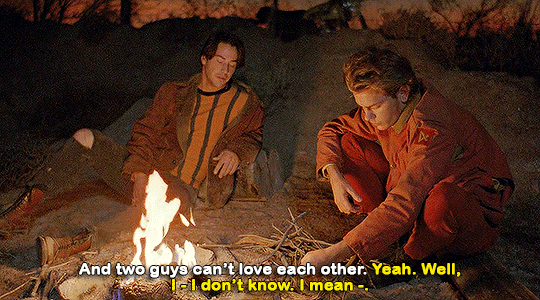
I will be thinking for way too long about the way that Scott stares at the ruckus everyone is making at Bob's funeral. Because, I don't know, I feel like there is almost a part of him that is longing to be there. That is missing it a little bit, or maybe feeling a little guilty. At least, that is how I am reading it as someone that worked with and considered myself friends with unhoused people. When I stopped working that job, I lost all connection with them, and the last time I got to see any of my friends again…was at a funeral.
When discussing my thoughts on this film with @bengiyo and @emotionallychargedtowel I was really cycling back and forth between where I landed in believing that Scott cared at all for the people he lived among for years.
Like there are shitty people who are homeless, sure, but there are also so many really wonderful people who are homeless, and there is no way that Scott, even as a rich bitch that was playing at poverty, did not forge genuine connections with people. At one point, he was sitting in a diner, comforting a woman who was upset. Do you know how many times I've seen that?
And when I started saying that I did believe that Scott cared in part for Mike, I was slammed with a visceral memory of Scott leaving Mike out in the cold, to sleep on some random guy’s lawn while he went back in to town.
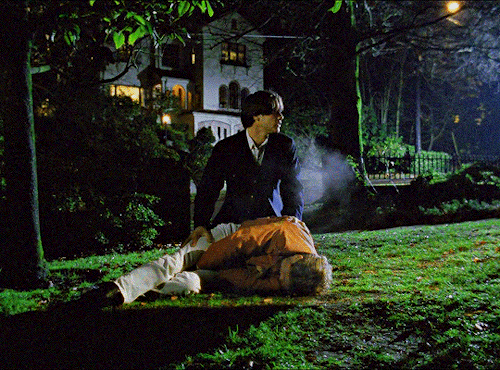
gif by @thejingshi
That said, he gave a reasoning of Mike being safer sleeping in that wealthy neighborhood with no one else around, then he would have been back in town. And similarly too, Scott holds on to Mike's half of the motorbike sales fund until it is time to send him away and also...he doesn’t give Mike all the money cause EVEN THOUGH SCOTT DOESN'T NEED IT!
I don't think he fully could have not cared. If he fully didn't care, I don't think the moments of tenderness would exist.
I don't think Scott would have gone to fucking Idaho
I don't think he would have been staring off the way that he was at the funeral
But you can't even get into the thought of like, Scott has strict rules to follow now that he has the inheritance money. But like…
No he doesn't.
His Dad is dead, and he has the money, what is anyone gonna do if he doesn't act like a refined gentleman? Nothing.
God I want to punch this man.
At the very least Scott and Mike were friends.

gif by @peeta

gif by @thejingshi
And so whether or not Scott gave a flying fuck about anyone else in that community, there is someone that he cared about, that he left to rot because it was more convenient for him. And I’d like to think Scott has to face that a bit during the funeral scene. Cause based on the way that it was shot, it looks like Mike is staring straight at Scott, but when we get the shot from Scott's POV, you can only see like the barest tops of heads and chairs flying so I don't even know that Scott and Mike
And the ending of the movie? God, heartbreaking. This whole film just made me see so many echoes of people I care about, having shit luck their entire lives, ending up on the streets, getting in to sex work of some kind, casually referencing their latest rape by a client, maybe having things be good for awhile (getting housing, getting reconnected with someone they care about, getting accepted in to school) and then just having that ripped away from them. Getting their shit stolen.
And on the other side of it too like, being connected, talking with one another, taking care of each other. All the times that someone has been having a particularly bad day, and before I could even go over and talk to them and check in, someone else from the community swoops in comfort them, and make sure they were doing okay.
I loved this movie. I think everyone should watch it.
By/For/About?
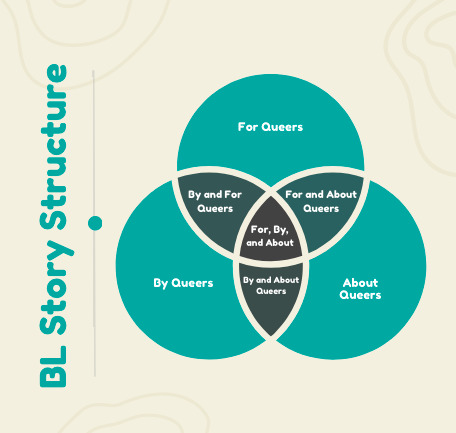
The Gay Trifecta!
We know that this is an About Queers film, because Mike is queer.
By Queers: I'm not 100% certain if the director is gay, it didn't say it explicitly anywhere, but he is behind a number of keystone queer films, and I think I saw an interview about gay activism that involved him.
For Queers: This is a story about the struggles of being a queer man, among other things. But I think the center of, loving a man you know can never love you back, and being fucked over by that in the end reads very much as for a queer audience.
Favorite Moment:

Everyone going buck fucking wild at Bob's funeral. It was such a moment of unrestrained energy, and I like it all the more for what it did to Scott.

Favorite Quote:

gif by @magnusedom
"I really want to kiss you, man."
If you know, you know. If you don't, watch the movie so you too can understand how devastating that line is.
9.5/10 Film
#my own private idaho#bengiyo queer cinema syllabus#river phoenix#keanu reeves#will never stop thinking about the way the filmed the clouds in this movie
54 notes
·
View notes
Text
Bengiyo's Queer Cinema Syllabus
For those who are not aware, I have decided to run the gauntlet of @bengiyo’s Queer Cinema Syllabus and have officially started Unit 3: Faith and Religion. The films in Unit 3 are: But I’m a Cheerleader (2000), Prayers for Bobby (2009), Latter Days (2003), Blackbird (2014), The Wise Kids (2011), Henry Gamble’s Birthday Party (2015)
Today I will be writing about
But I’m a Cheerleader (2000) dir. Jamie Babbit

[Run Time: 1:30 , Available: tubi, amazon, google play, apple play, Lang: English]
Summary: A cheerleading-obsessed teenager is sent to a strict summer camp when her parents suspect her of being a lesbian.
Cast:
* Natasha Lyonne as Megan
* Clea DuVall as Graham, Megan's love interest
Note: I watched the 2020 Director’s Cut
__
Hello, I have entered The Danger Zone. For the next two units I expect to be absolutely and utterly dashed upon the rocks as I start Unit 3: Faith and Religion, and eventually wash it down with Unit 4: Heartbreak Alley.
Ben is being nice by having the first film on the list be But I’m a Cheerleader, so at least we can ease our way in to the conversations around conversion therapy and religious trauma to the queer community with some dark humor and bright colors.
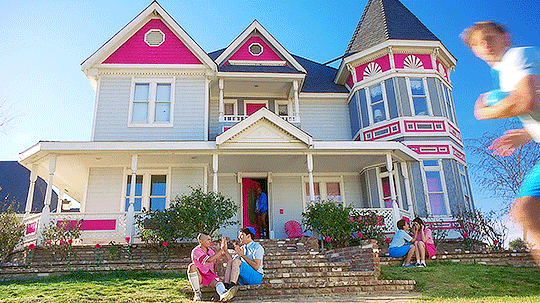
While I decided to embark on this syllabus project because my experience with queer media has been severely limited, there is at least one movie in Units 1-6 that I have seen before. For Unit 3, it is this one. I love this movie. I love this movie because for all that it is dark, for all the pain you see being carried by these queer teenagers, for all the harm that has and could be done to them throughout their time at True Directions, the film wastes absolutely no time highlighting the absolute absurdity of programs like this. What do you expect to happen when you put a bunch of horny, queer teenagers in a room together? But I’m a Cheerleader does a phenomenal job at maintaining the fact that queerness is inherent, it is not learned, it is not chosen.
And it does something else that I picked up on this watch through, that makes me appreciate it even more, which is that it kinda pokes fun at 12 step-programs.
I don’t know that I have really talked about this much on my tumblr, I know I have referenced it a couple times in like…comments and conversations with some of my mutuals on tumblr about my opinions on Alcoholics Anonymous. Before I dig in to it, I will preface that AA and NA works for who it works for, and that’s cool, but I have strong negative opinions on these 12-step programs as a harm reductionist because they hold abstinence as the ultimate goal of substance use recovery, they are super religious, and they generally espouse anti-harm reduction ideologies. So seeing True Directions have a five step program, where the first step is literally admitting you have a problem are a homosexual, and to see these steps be a) absolutely absurd, b) random, and c) ineffective made me so happy.
[OKAY WAIT REST OF POST ON PAUSE BRIEFLY SO THAT I CAN SHOUT ABOUT THE DIRECTOR OF THIS FILM AND THE FACT THAT AS I WAS RESEARCHING FOR THE FOR/BY/ABOUT SECTION, THE DIRECTOR, JAMIE BABBIT’S MOTHER RAN A TREATMENT PROGRAM FOR TEENAGERS WITH DRUG AND ALCOHOL PROBLEMS THAT WAS NAMED NEW DIRECTIONS, AND THAT IS WHAT TRUE DIRECTIONS WAS BASED ON. HAHAHA! That is the most succinct confirmation of my read on a piece of media I have ever had]

For real, this program did not work on a single one of the residents by the end of the film, and that is absolutely what needs to happen.
I love that the kids sneak out to go to a gay bar, I love that when the kids fail the conversion therapy program they get taken in by survivors of True Directions and find safety in a queer-positive house, especially because (as we see with Megan) if the kids fail the program they do risk homelessness. Which is a very real and present threat to queer kids today, both conversion therapy and possible homelessness.
I like that Megan’s parents picked up on the fact she was queer before Megan herself did (shout out to vegetarianism, I literally wrote ‘vegetarian’ in my notes as an observed potential indicator lol) and find it is absolutely an intentional point that Megan would very possibly not have realized she was queer if her parents hadn’t sent her to conversion therapy, because it was not until a fellow queer was like “not all girls think about what you are thinking about when you look at girls”
And it always hurts my heart a little when I hear people say their parents make comments sometimes that are like “well, everyone thinks about kissing a girl sometimes” etc etc and are still existing under the belief that they are straight. Megan seemed completely oblivious to her own queerness until other people pointed it out, and her parents might have had the intended outcome of a “straight” child if they had just kept their mouths shut and minded their own goddamn business.
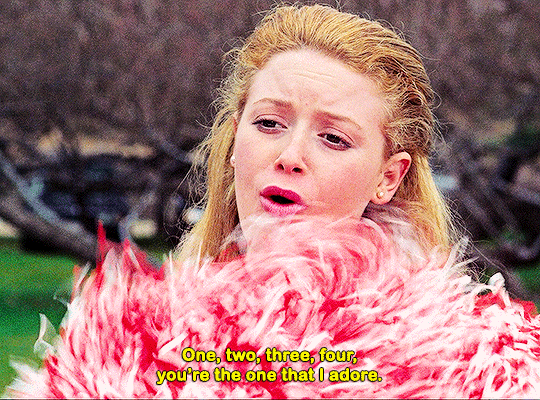
Not that we want Megan to be straight, but more just that the film itself feels like it does make a point of calling out the fact that putting your queer kid in a room with other queer kids is going to help them understand themselves better. It’s why cishets are so terrified of trans people, because the more visible trans and/or queer people are, the more people are able to question their own identities, and the more the white supremacist society we have built in the United States starts to become undermined by the degradation of a pillar of patriarchal heteronormativity, etc etc.
I love that on the boy’s side of True Directions all the little decorations of like…shop tools and soldiers look sexual. The soliders look like they are either getting fucked in the ass, or about to perform oral sex. The tools look like dicks, it’s very much indicative of the fact that even the adults who say they have been “cured” really have not been, because they are still creating scenery and teaching these boys how to be straight while subconsciously producing images of queerness.
I love that But I’m a Cheerleader is also able to challenge our own perceptions of queerness and heterosexuality. I love that it is Jan, who looks the most butch/masc of all the girls who is revealed to be heterosexual, and I think it is vitally important to see this not only as commentary around judging people based on appearance, but also can be used as a discussion point about the masculinization of women of color, and in addition the fact that all the girls are turned on watching Jan vacuum the floor, demonstrating that masculine women can be seen as hot/sexy.
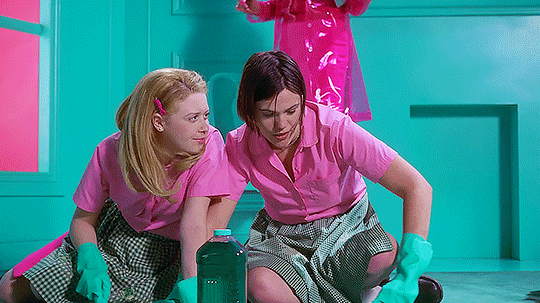
Anyway, I love this movie a lot, I think the messaging is great, I think it can read a little more serious for a queer audience than a straight audience around the actual extent of the damage done to these characters during their time at True Directions, but I think there are all of these little things that make the funny moments funnier if you are queer.
For/By/About

For sure by and about queer people. Both the director, Jamie Babbit, and the screenwriter, Brian Wayne Peterson are queer. I will admit that for a bit during the film I struggled to decide whether or not this film was made for queer people, because in some regards I thought that perhaps the purpose of But I’m A Cheerleader was to show straight people how fucking stupid conversion therapy is. But, I have actually landed on The Gay Trifecta for this one.
Jamie Babbit stated that part of her inspiration for making this film was because she wanted more representation for fem lesbians in media, and that she decided to make it a romcom because of how media has historically treated lesbians (if you have read some of my other posts, we know I have talked about that history multiple times).
Favorite Moment
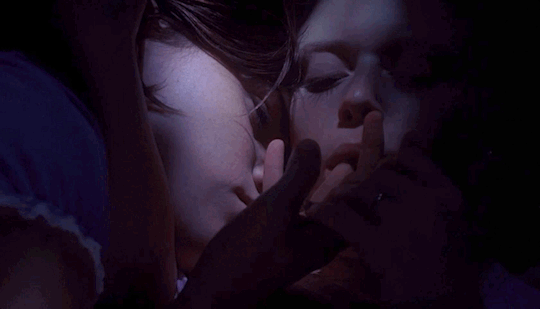
SEX SCENE! So, I am pretty certain that I watched But I’m A Cheerleader for the first time before 2020, and therefore I did not have access to the director’s cut. But, in 2020 Babbit released her own cut of the movie, which is 5 minutes longer and I think the only difference between the two films is the addition of a sex scene that had been cut out of the initial film. It is not a hardcore scene by any means, but it is absolutely gorgeous, and it has some very clever and important shots contained within it, the most memorable for me being the shot of the cross necklace Megan always wears as she is actively having sex with Graham.
Favorite Quote
“You are who you are, the only trick is not getting caught”
God is that just like a bullseye statement for queer people, especially the ones who have to stay closeted. Such a quick line, such an active acknowledgement of threat, because everyone that ended up at True Horizons either got caught or couldn’t hide.
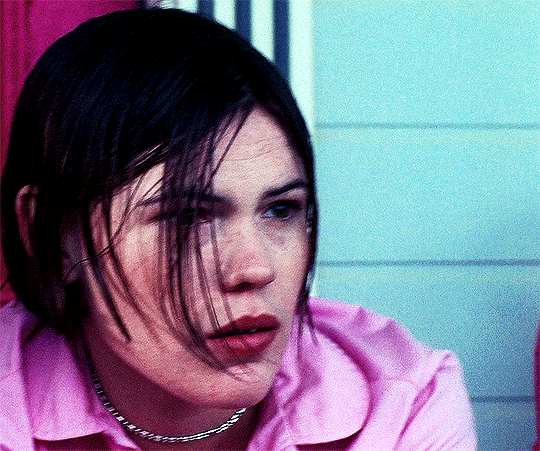
Score
10/10
Next up, Prayers for Bobby, and uh, I have it on good authority that it may leave me looking like Graham in that gif directly above this sentence.
#queer cinema syllabus#bengiyo queer cinema syllabus#unit 3#but i'm a cheerleader#natasha lyonne#clea duvall
49 notes
·
View notes
Text
Bengiyo's Queer Cinema Syllabus
I am currently working my way through Unit 4: Heartbreak Alley, the totally light-hearted, definitely not agonizing section of @bengiyo’s queer cinema syllabus where I get to watch countless acts of violence be committed against queer people. Thank fuck I have Lesbians waiting for me at the end of this unit. The films in Unit 4 are: Bent (1997), Strange Fruit (2004),Boys Don’t Cry (1999), Brokeback Mountain (2005), Parting Glances (1986),Philadelphia (1993), The Living End (1992), Holding the Man (2015), Jeffery (1995), and Boys on the Side (1995).
Today I will be talking about
Holding the Man (2015) dir. Niel Armfield
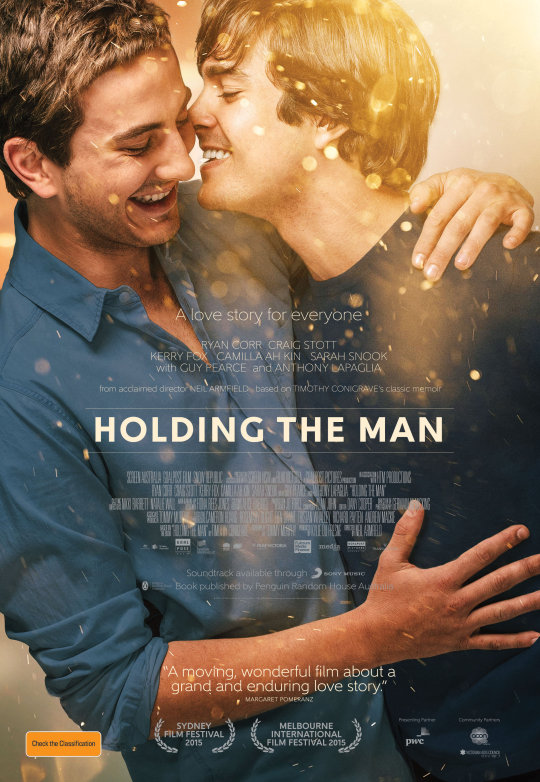
[Run Time: 2hr 8 min, Available: Google Play, Language: English]
Summary: The warm, funny and achingly sad story of the 15-year-long love affair between Timothy Conigrave and the boy he fell in love with at high school, John Caleo. (IMDB)
Cast:
Ryan Corr as Timothy Conigrave
Sarah Snook as Pepe Trevor
Craig Stott as John Caleo
__
So, as anyone who has seen Ben’s syllabus should know, he was very intentional about setting it up as a lead in to BL. Sometimes I wonder how some of the movies may apply, but I definitely understood where he was coming from with this one…
Ben wanted to show any person going through the syllabus the parallels between BL and Western films that let 30 year olds in terrible wigs play high schoolers.
He also definitely put this movie on the list because these characters are gay boys in a Catholic school.
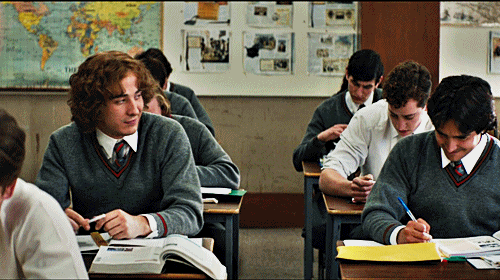
gif by @captnswilson
Anyway, I thought this film was very good, it started off very strong not only with the phone call that cannot be more than two minutes that tells you everything you need to know about the characters, how they are connected to each other, where they are in the present. Especially when you know by the time the phone disconnects that John is dead, especially when the camera cuts to three old men looking at Tim as he tries desperately to call back, a stark reminder that Tim and John will never reach old age.
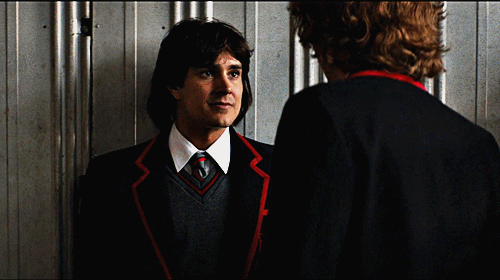
gif by @captnswilson
I think the biggest thing I was struggling with in this entire movie was how indiscrete Tim and John were being about their relationship. Like, seriously, full confession, I thought the consequences of their physical intimacy would be because of Catholicism. Shielded by my own age I guess in part, but also hugely because of their lack general lack of fear or discretion, I fully forgot it was illegal to be gay in 1970, when Tim is fully reaching his hand down John’s pants at school, and putting love letters on his desk at school, and giving John hand jobs in his living room, and fucking with the doors unlocked when their friends go out fishing.
That said, I do appreciate that even under the threats from their school, from their parents, they choose each other over and over again. They are unfazed and unashamed of their relationship and I think that sets the movie up to be all the more tragic because you can kinda tell what’s coming. The fact that they have fought against it all, they have loved each other fiercely and openly and relatively unafraid, makes John’s inevitable death all the more tragic.
I think the production of this film was really smart, with some really wonderful transitions between scenes and the background music, or a line, or a lingering camera shot. For example when Pepe sends the kiss around the table, and after John and Tim have kissed each other and Pepe tries to take any suspicion of Tim’s feelings away by closing the kissing circle, we hear audio which soon after cuts to mass. The line of course being “To those trapped in the darkness of sin that the light shining in Christ may free them…” The way that John’s father thanks Tim for helping John come out of his shell, only for Tim to unzip John’s sleeping bag, literally opening a casing that was covering John a few scenes later so they can have sex and cuddle during a sleepover.
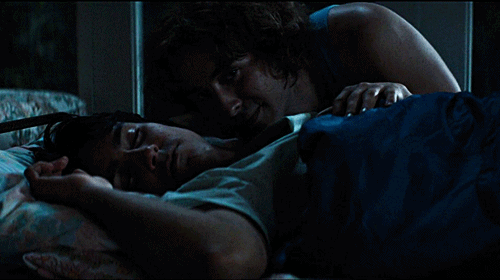
gif by @captnswilson
The way the editing supports the discovery, the tension of John’s father finding the letter, while we see John and Tim fucking at the cabin, the friends coming back to catch them in the act, the way the music stops when John’s Dad is interrupted from his thoughts as he starts to read the letter around the same time that Tim slams the door shut on his friends. The way the silence in John’s room from his father is co-opted for the silence in the cabin’s living room with all the boys playing poker as if nothing had happened. The close up of Tim’s hand shaking the man he is interviewing, and then the subtle way Tim wipes his hand against the arm of the chair he is sitting in as if he can catch AIDS just by touching someone who has it.
I have a thing for movies about AIDS letting their characters bleed. I really love the choice, the knowing that comes with seeing those bright trails of red. The weight to it. I love so many acting choices in this film, the scene of Tim and his mother preparing food after he comes home for his sister’s wedding only to find out that his mother read a letter addressed to him that essentially told him he had AIDS. I love when Tim can’t complete a scene after his acting teacher so thoroughly reads him, and honestly…respect, I appreciate that Tim is willing to admit that. I love the image of John’s father closing the door to their house after John puts his foot down, reaffirms to his dad that he loves Tim and says there is nothing he can do about it. Because the door to their house has bars, and it looks like John’s father is locking himself up in a cage. Trapped inside while John and Tim drive off in to the world. To experience it in its fullness while John’s father cowers away.
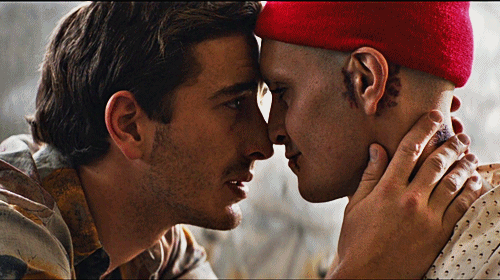
gif by @captnswilson
I think the scenes where John was sick and where he was dying was super well performed. Hell, the entire thing was well performed, but to see Craig Stott go from strong athlete to gasping for breath, so sure footed to unsteady on his feet. I am in love with the blushy little smile that John gives Tim when Tim takes his picture and calls him beautiful after they have shaved John’s head, and glued dinosaur figurines to it. This film does such a phenomenal job of realistically, believably portraying love.
I’m thankful to the writing for acknowledging sex workers and intravenous drug users, they are our brothers and sisters, they are us, we are all family, and I think it is important that we don’t forget them when we discuss AIDS, and the people we lost to it.
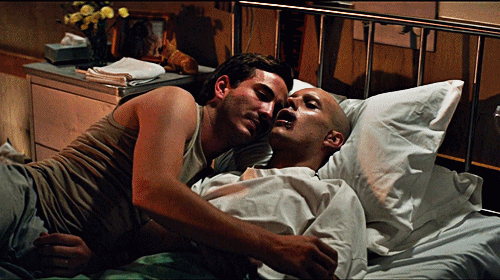
gif by @captnswilson
I think they handled John’s death very lovingly. I am sure that I would have been bawling if I didn’t end up in a lovely two and a half hour conversation with a friend just before he draws his last breath. And again, the choices here, the loud, agonizing breathing John has when he sleeps, and the way the silence settles in when he draws his last breath. I am glad John told Tim in his own way that he was ready to go. That when he collapsed at home it was so easy. There is no way losing someone you love that deeply isn’t devastating, but at least for me, death is a little easier when I know someone is ready.
I love that John kept his promise, not to die unless Tim was by his side, and that Tim whispering in his ear “I’m here” was what finally gave John permission to go. (I WANTED TO PUNCH A HOLE THROUGH MY TV WHEN JOHN’S PARENTS DIDN’T LET THE PRIEST SAY TIM WAS ANYTHING MORE THAN A FRIEND TO JOHN.) I loved that we ended the film with Pepe telling Tim that John was by his side, right before we learn that Tim died ten days after he finished writing his book.
I should have known, I guess, that this was based on a real story, because of the nature of the material, but for some reason I didn’t. Maybe I missed a title card somewhere or something. But I do think there is something so beautiful about being able to immortalize John, immortalize Tim, and immortalize their love for each other in a book. That their love story was told again through film. That there is no way to deny their love for each other now.
Favorite Moment
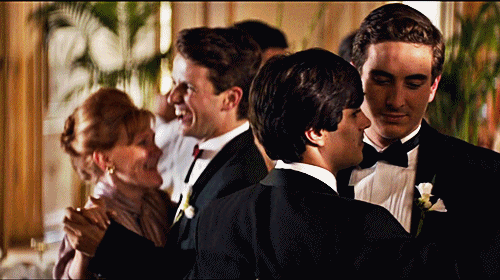
gif by @captnswilson
Honestly, I really loved the sex scene between John and Timothy near the end of the film when they are back in John’s childhood home to celebrate Christmas with John’s family. John has been receiving treatment for cancer, and is very weak, on oxygen and everything since his lungs have been having a lot of trouble recently. I love that every part of it is so slow and tender, John and Timothy dancing together in John’s room, paralleling the way they danced together at Tim’s sister’s wedding not long after their HIV diagnoses.
John, as weak as he is, as hard as it is for him to breathe, asks Tim to screw him, and we get absolutely the slowest and most intentional sex scene of the entire film (and there are many sex scenes in this film). I do not think that all sex needs to be tender, do not get me wrong, but I did really love the way that with how obvious it is that John does not have much time left, they take their time with this. It is just such a beautiful expression of love between these two. I appreciate too that they make this sex scene beautiful, that sex between an actively dying cancer patient is held as high or higher in beauty and artistry as all the sex Tim and John were having over the 15 year course of their relationship. It is very obvious that this is a last goodbye, but for all that sex has at times been avoided in this film, for the time it brought HIV into their lives, sex is not a bad thing, sex is a necessary and wanted thing, I just liked it as a part of their goodbyes to each other.
Favorite Quote
“How can you write this play? You’re making assumptions about your status.”
Honestly. What an incredible fucking line. Tim sitting in a room, interviewing a man who is dying of toxoplasmosis because of his HIV status for a play. I am not opposed to people making plays about terminally ill people. I do think it is important to immortalize, to remember, to tell stories. But for the love of GOD you canNOT go waltzing in to a dying man’s apartment, wipe your hands on his chair after you shake his hand because his AIDS disgusts you, and then demand his life story and his thoughts about dying.
Tim had so much unprotected sex in college, Tim is hiding from the (possible) truth, Tim does not want to know. What right does Tim have to ask others for their stories when he is running from his own?
Score
9/10
#sorry this is not my finest work#I normally do my write ups immediately after I watch a film but I did not do that this time so things aren't fresh#bengiyo queer cinema syllabus#queer cinema syllabus#holding the man#holding the man (2015)#unit 4: heartbreak alley#two more to go in unit four#the end is in sight#the lesbians are calling to me
16 notes
·
View notes
Text
Bengiyo's Queer Cinema Syllabus
For those who are not aware, I have decided to run the gauntlet of @bengiyo’s Queer Cinema Syllabus and have officially started Unit 2: Race, Disability, and Class. The films in Unit 2 are: The Way He Looks (2014), Being 17 (2016), Naz and Maalik (2015), The Obituary of Tunde Johnson (2019), Margarita With a Straw (2014), My Beautiful Laundrette (1985), Brother to Brother (2004), and Beautiful Thing (1996)
Today I will be writing about
Beautiful Thing (1996) dir. Hettie MacDonald

[Run Time: 1:31, Available on: tubi, Amazon Prime, YouTube rental, and Google play]
Summary: “Jamie is a shy teenager, often bullied at school. His neighbour Ste has a rough time at home, being beaten by his father and brother. This issues bring them together and they find that what they feel for each other is more than friendship.” from IMDB
Cast
* Glen Berry as Jamie Gangel
* Scott Neal as Ste Pearce
* Linda Hentry as Sandra Gangel, Jamei’s mother
* Tameka Empson as Leah, Jamie and Ste’s hot mess of a neighbor
___
Ok, I will be honest, this one did not get me to connect to it as emotionally as some of the other films in this Unit and there were a few scenes in the middle where I completely lost the plot and had difficulty understanding what exactly was going on. As a result, I don’t have as much to say about this film. But overall, I did enjoy Beautiful Things and I think my favorite aspect of it fully comes down to it’s depictions of community and family. And honestly, I feel a little bit bad, but I think Sandra Gangel, Jamie’s mother was probably the most interesting and compelling character for me in this whole film, followed closely by Leah.
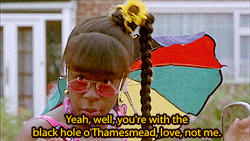
I don’t have as much to say about this film in part because I think that the other movies in this unit do a lot more with the intersections of identity, and have interesting things to say that require a bit more unpacking. But I do not think that is as much of the case here. It feels more akin to a coming of age film than the others in this unit.
I love that Sandra is somewhat complicated and three dimensional, and also that she is ride or die for her son. I think it is so accurate and wonderful to have her yelling at Jamie for skipping school one second and then lying to the teacher about him having a stomach ache the next. I like that we get these insights in to her character, her background, the life she lived before she had a son, that help explain the relationship she has to raising Jamie and why their dynamic is the way that it is. I love that she isn’t fully mature, and that she is willing to throw hands with children when they are being gossipy little bitches spreading (mis)information.

I did find it very interesting and pretty decent commentary that we never really learn the reason why Ste is abused by his father and his brother. Perhaps it is because they know something is different about Ste, but ultimately, we are not given a reason, and that is so much of abuse, right? Especially by having Ste’s brother be an abuser as well, is Ste’s brother abusive just to be abusive or is Ste’s brother abusive to keep himself out of harms way?
But as I said above, my favorite aspect of Beautiful Thing is the throughline of community and community care. Namely that Sandra knows that Ste is being abused by his father and brother and she takes him in to her home so he has a safe place to rest. This is shit that I have seen my own family members do in their small communities. People they have raised like their own because there was no one else around them who would keep them safe.
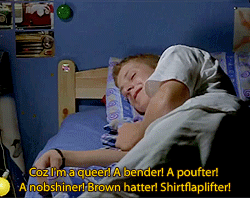
I like that they don’t have to have Jamie come out explicitly and state how long he has known that he is queer, and yet I sensed The Knowing on him. I like that he calls out Ste’s own fear of being called queer, while admitting he might be afraid to be called that himself, but that I do not see shame in Jamie in the least. I like that we are spared from the bullying Jamie faces for being queer in school, and only see the aftermath of it.
I think it is really important to show high school students who understand their own sexualities and are confident in them, and I think Jamie is a really killer example of that.
For/By/About
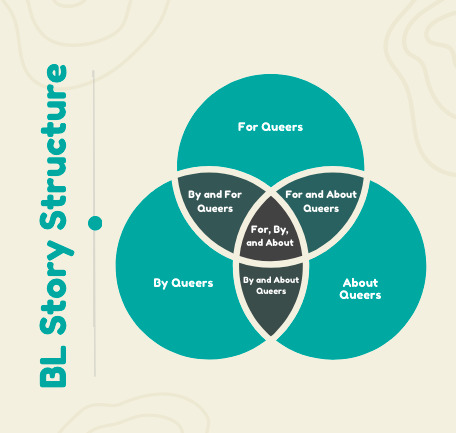
By and About. The playwright of the original story is queer. I’m thinking about whether or not it would behoove me to do away with this section of my reviews because my determinations for this are vibes based and the last few films when the identities have been intersectional are much harder to parse. On one hand, I think you could say that having these boys be happy and letting Jamie have an accepting parent could be for the queer community. But I just…did not connect to this as a queer story. For me, and perhaps it is by nature of having women who are written and performed as human beings, I found the story around Jamie and Ste’s connection to Sandra to be far more interesting, and only the last like…15 minutes of the film have anything to do with Sandra’s reaction to Jamie and Ste being queer.
Favorite Quote
“There’s an island in the Mediterranean named Lesbian and all it’s inhabitants are dykes”
I do not think this requires any explanation.
Favorite Moment

gif by @bl-bam-beyond
Honestly, I am a really big fan of the dance at the very end of the film. I like how quickly and easily it shows Ste and Jamie’s acceptance and comfortability with their relationship. I like that Leah and Sandra joined in at the end, both establishing themselves as allies and normalizing two people of the same sex dancing together. While there were a few other moments that were more emotionally compelling, the dancing scene at the end is a joyous celebration and moment of visibility for queer people, and I think a little dance in the sun is the perfect way to close out Unit 2, as I head towards The Rough Units: Unit 3- Faith and Religion and then eventually Unit 4- Heartbreak Alley.
Score
9/10
I think structurally and technically it was sound, it dipped in the middle, and I was overall less invested than other movies in the syllabus, but it was still very good.
__
And with that, I am done with Unit 2! On to Unit 3: Faith and Religion which I am sure is filled with nothing but upbeat, positive, happy stories..... (can you hear the sarcasm). Be warned as I have been warned that the next couple units are gonna be filled queer pain.
42 notes
·
View notes
Text
Bengiyo's Queer Cinema Syllabus
Context: @bengiyo made a hypothetical queer cinema syllabus for a hypothetical baby gay to watch. I said "fuck it I'll do it," and he said "dear god, there are so many movies on here, pick three from each section" and I said "absolutely not, I shall watch them all. And here i am I think over a year later and only four sections in. Anyway I am working my way through Unit 4: Heartbreak Alley right now which is:
Bent (1997), Strange Fruit (2004),Boys Don’t Cry (1999), Brokeback Mountain (2005), Parting Glances (1986),Philadelphia (1993), The Living End (1992), Holding the Man (2015), Jeffrey (1995), and Boys on the Side (1995).
Today I will be talking about
Jeffrey (1995) dir. Christopher Ashley
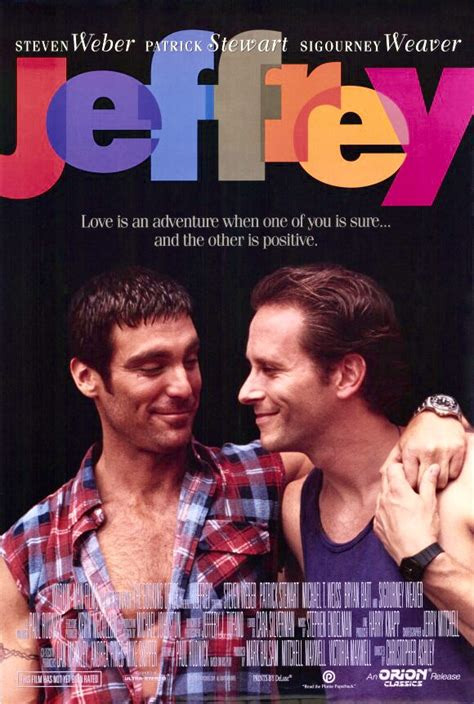
[Run Time: 1:33, Available: Tubi, Google TV; Language: English]
Summary: A poignant romantic comedy about the quest for love and intimacy in the age of AIDS. A story of a thirtyish gay actor/waiter who decides to become celibate...the risk of AIDS has taken all the joy from sex.
Cast:
Steven Weber as Jeffrey, main character
Michael T Weiss as Steve Howard, love interest
Patrick Steward as Sterling. Jeffrey’s friend
Bryan Batt as Darius, Sterling’s boyfriend
Content warning: this film very much has some costuming choices and lines that do not age well
__
I love seeing how movies handle matters of grief, and all the little ways the world continues to turn even as you feel like your life has tilted on an axis. I feel like Jeffery does a really great job of showing this kind of push and pull. It is simultaneously absurdity, the comedy, the pain, it’s all there, and it’s real, and I think it balanced it well without ever tipping over the edge in to something so sad as to move me to tears. Which, I think is the point because this is very much listed as a romantic comedy and I am inclined to agree, at least with the comedy part because this film was very funny.
And it was fun.
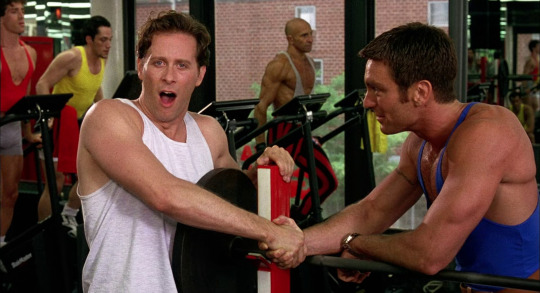
It was so much fun to watch!
This film is based off of a play and thus the structure of the film is wonky, it’s disjointed, motifs in some ways, it breaks fourth walls left and right, it spirals in to dance numbers and jeopardy style fantasy all the time, and you can tell that the people making this movie had a really really great time doing so. It was bright, it was vibrant, it was full of life.
And coming to the end of this movie, it makes so much sense, the intentionality behind the ridiculousness of its scenes, the vibrancy of its sets, the colors and the characters. The intentionality behind the seriousness of it too. The fight between Steve and Jeffrey out front of Steve’s apartment, the conversation between Sterling and Jeffrey in the hospital after Darius died. This is a movie about living. Living despite.
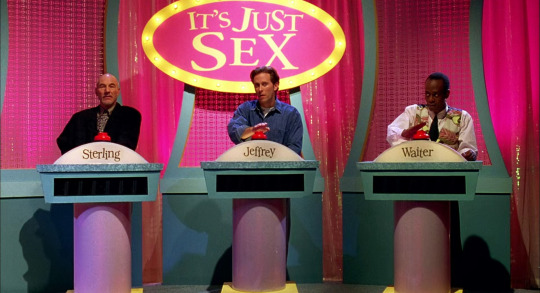
Jeffrey is terrified of HIV/AIDS. So terrified that he goes from fucking as many people as he can to abstaining from sex altogether. So terrified that he pushes away a man that he has hit it off really well with after finding out he’s HIV positive. So terrified that he is going to sublet his apartment and run away back to Wisconsin to hide from it all. Jeffrey is afraid of death, he is afraid of sickness, he is afraid. So much of this unit has been about what we lost to AIDS. The people we lost, the loves we lost, the memories we lost. And while losing loved ones is a part of this film as well, that is not its primary message. Jeffrey focuses on the life that Jeffery lost, the love, the memories he never made because of fear. He hurt Steve time and time again, he didn’t (or wasn’t going to) march in Pride, he yearned desperately for sex but would not engage in it in any form because he was scared of getting AIDS, and he was scared of losing people to it too.
I feel like “it is better to have loved and lost than to never to have loved at all” is an appropriate quote when it comes to the thesis of this film. Though I might tweak it to something more like… “it is better to live with loss than to never live at all.”
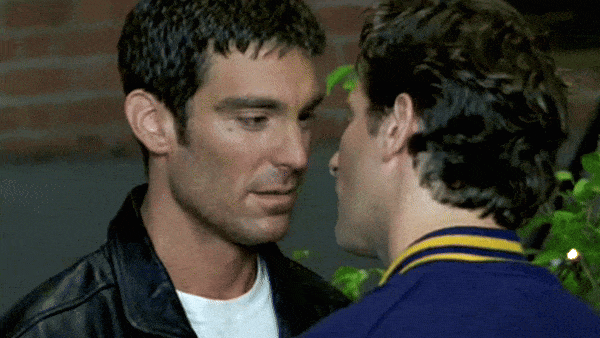
gif by @ballumville
This film is listed as a comedy, and something that I personally find absolutely crucial to good comedy is sincerity and seriousness. I do not want comedies to be funny all the way through, I much prefer when a comedy reminds you that it knows the world we live in and finds laughter in it anyway. Because that feels so much truer to life. Jeffry, Darius, and Sterling are at yet another memorial, and they are cruising, and it is not that they aren’t sad to lose another person, but there are just so many men there. Jeffrey, Darius, and Sterling are at yet another memorial and Darius and Sterling insult the choice in music, start to talk about Darius’ inevitable death and Jeffrey doesn’t want to hear it. Jeffrey, Darius, and Sterling are at yet another memorial and Darius and Sterling adorn fancy grieving hats they have stolen from the coatroom to lighten the prayer.
Grief is learning someone you love has died, and the timer for the oven going off because your lunch is ready. Grief is learning someone died while you are wearing a sweater with In Dog Years I’m Dead printed on it. Grief is learning someone died, and still going to the dinner you planned to have with a friend. Death is terrible and absurd, and lives are changed in an instant, and you can’t stop your roommate from making a joking “everyone still alive?” comment when everyone is very much not. Death is terrible and absurd, and like Jeffrey you go to the hospital to visit a friend, and you have a conversation with them for a full five minutes before he tells you his partner died half an hour ago. Death is terrible and absurd and you are able to cry but the ghost of your friend comes to visit in his CATS costume and tells you everything will be fine.
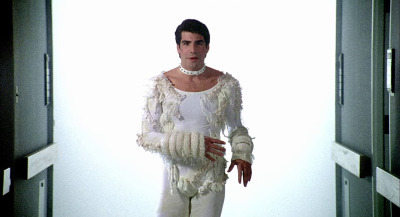
Jeffrey is scared to have sex, he is scared to acquire HIV, he is scared to lose those he loves to the disease. And he strains against the confines he’s put himself in, all these old parts of himself slipping hands through the bars of their cage. But Jeffrey has trapped himself in a hell of his own design and he’s slapped the label AIDS overtop of it and resigned himself to a boring, meaningless existence away from his life and his friends and all the potential lovers he might find because of his fear.
This film was funny, it gave you as many reprieves as it could, it held resolute in its sincerity when it needed to, and eased up on the gas before things could go to far. It was funny, it was whimsical, I had a lovely time seeing all the little ways they took a stage play and adapted it for the big screen. I lost my mind at how many truly phenomenal, A-list actors were in this film, most in small guest roles. I’m talking: Sigourney Weaver, Kathy Najimy, Nathan Lane, Christine Baranski, and quite a few more.
I had a great time watching this film, I loved it alot. Mother Teresa smoking a cigarette and playing piano and all.
Favorite Moment
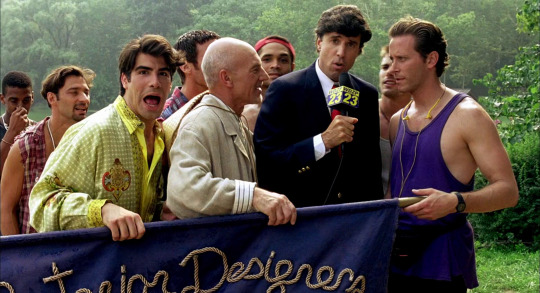
God there were so many good ones. I think my favorite moment is actually the scene during Pride with the newscaster, all these gays crowding around him as he tries to give his report. Getting interrupted by Steve and Sean and Sterling and Darius, the narrative to get straight to the point of Jeffrey’s character in that moment by having the reporter ask Jeffrey what he planned to do during Gay Pride and to have him answer “I’m running” (fucking brilliant), and then of course the moment to end all moments. Sterling telling the newscaster that Angelique was going to get her penis removed after Pride, and seeing her mother proudly exclaim “it’s coming right off!”
It was such a tight and effective way to show the dynamics of the main characters, how much life and excitement Darius had in being on the news in that moment, the way that Jeffrey was standing apart from everyone else, that he was described as someone who ‘could be anyone’, that he was so visibly outside of the celebrations.
Favorite Quote
“Of course life sucks. It always will. So why not make the most of it? How DARE you not lunge for any shred of happiness?"
A strong contender for my favorite scene of the film, I really loved the push and pull of the scenes with the clergyman. Nathan Lane is a brilliant performer, as is Steven Weber and it is really fun watching moments where you stick two talented people in a room together and let them just cook with gas. I have probably said it too many times at this point that there is a very smart balance between comedy and drama in this film, and the entire scene between these two is one of the clearest examples of that. This line is said to Jeffrey by the Catholic priest as they leave the confessional where the priest has just been talking about how God is in musicals. And Jeffrey is just “what about”ing his way to the endless, miserable spiral of a man who cannot see the joy that rests just beyond his fear.
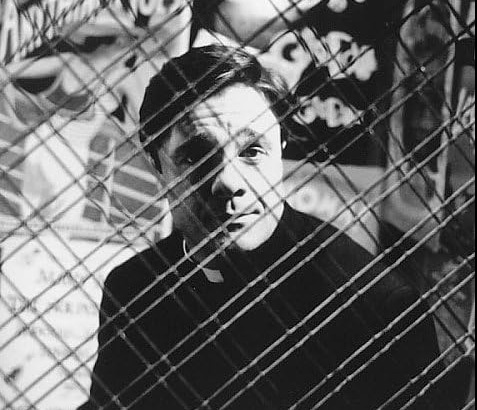
I love this line because as someone who has had a non-zero number of lows in their life, I have gotten through those periods of fear, of doubt, of misery by reaching for the smallest joys. In some of my worst bouts of stress, depression, whatever I kept a journal where I forced myself for months, just before bed to write three things I was grateful for that I had experienced that day. So that I might end my day on a positive, and so that I might look back when I needed to to see that no day is wholly good or wholly bad.
So I appreciate seeing characters get beat over the head with something preachy like that, like grabbing for scraps of happiness wherever they are.
Score
9/10
There were so many great moments, there were so many beautiful lines. It was expertly balanced, and I will never look at balloons the same way again.
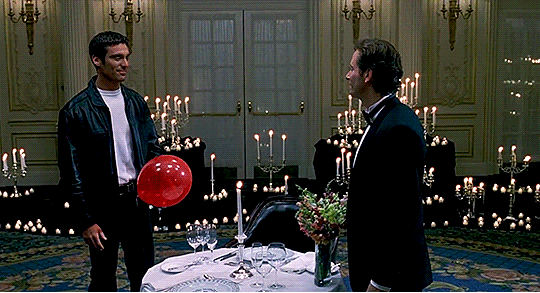
#bengiyo queer cinema syllabus#queer cinema syllabus#one more film to go in this section and then it is on to lesbians!#jeffrey#jeffrey (1995)
15 notes
·
View notes
Text
Bengiyo's Queer Cinema Syllabus
For those who are not aware, I have decided to run the gauntlet of @bengiyo’s Queer Cinema Syllabus and have officially started Unit 2: Race, Disability, and Class. The films in Unit 2 are: The Way He Looks (2014), Being 17 (2016), Naz and Maalik (2015), The Obituary of Tunde Johnson (2019), Margarita With a Straw (2014), My Beautiful Laundrette (1985), Brother to Brother (2004), and Beautiful Thing (1996)
Today I will be writing about
My Beautiful Laundrette (1985) dir. Stephen Frears
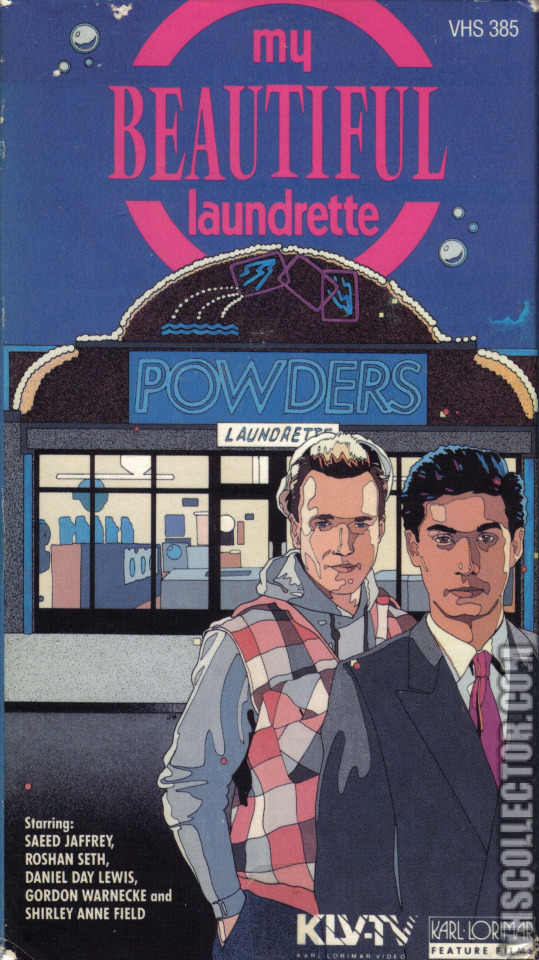
[Run Time: 1:37, Available- Amazon, Hulu, Language: English]
Summary: “An ambitious Pakistani Briton and his white boyfriend strive for success and hope when they open a glamorous laundromat.” (from IMDB)
Cast:
* Daniel Day-Lewis as Johnny
* Gordon Warnecke as Omar
___
Hmm. Okay so, before I get too far in to this, I feel like this film was the hardest one for me to follow from a plot standpoint (so far). There were a lot of little things happening that took a bit for me to really understand, and that caused some challenges in how I engaged with this film. I will admit at this point that this was a movie I probably need more historical context for (ie some of the political commentary in the film, the state of Britain at the point in which this film was made, etc.) but my brain is fried from life stuff, and I do not have the energy to do that research right now.
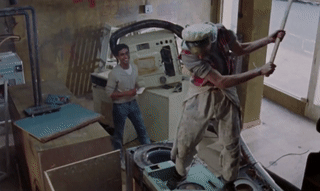
gif by @itsmyfriendisaac
Fundamentally, I do think there is something extremely interesting in the role reversals here of the Pakistani immigrant family being the richer, more successful characters, compared to the white people in the film. And this makes sense because what I was able to get through the movie is the racism that came out of Pakistani immigrants moving to Britain, establishing lives, and then becoming the scapegoats for the suffering of poor white people (when obviously they are not the actual problem).
Omar comes alive at the thought of getting to make something out of his life, rather than just be a caretaker for his father. A father who has become a victim to the racism and vitriol he has witnessed in Britain. A man who gave compassion, advice, care to young white boys only to see them march against him when they grew up.
I loved the visual commentary about how women can be forgotten, every time that Nasser’s wife walked by a room, quiet, unnoticed, and soaking in all this information about Omar, Tania, and Nasser’s affair.
I did love the visual commentary around ever looming danger. This standstill that Johnny’s old crew came to with Johnny, Omar, and the laundrette. A show of numbers, a threat of violence, that never triggered because there was no reason to do so. Johnny still had power and influence over his white friends, and that kept them quiet. But they loom. They are an ever present danger that Omar just ignores. Omar and Johnny continue to live their lives, build out the laundrette, try to achieve success despite the ever present danger. Which is as strong as a visual metaphor you can get towards existing as a part of one or more oppressed groups.

I like that fundamentally, Omar did all of this to show his Dad that he could be successful. Because he wanted to show his father that everything he’d heard said about him by the white boys he went to school with, and by Britain were wrong. That he was successful, and he had white people working for him. And how that is only revealed when Omar and Johnny have done the work of selling coke, refurbishing the entire place, and then opening it. I like that Omar’s father does not consider his son opening this laundrette as a success, because he wants Omar to be educated. Because he understands the importance of education, and how a lack of education makes people susceptible to propaganda. I also appreciate that Omar was spared from hearing that.
I love that Omar and Johnny’s feelings for eachother are never really disguised. Like, if you are queer, you can see from the second they are reunited that those two have almost certainly fucked before. But that good old fashioned heteronormativity is what really seems to shield them from suspicion by most people (besides Tania it seems).
And for as brutal of a beating as it was, I did genuinely enjoy the scene both for the commentary around how no one really is ever safe. That once your former in-group decides you are now part of the out-group, you are no longer safe. And further, that Omar very adamantly, casually, and happily took care of Johnny and treated his wounds and did not let him leave because he does love Johnny. I love that the film ends with the two of them in the laundrette, with Omar kissing the back of Johnny’s neck, in front of a couple shattered windows. Why? Because for me, it speaks volumes about how Omar views his relationship to Johnny and the world. He treats Johnny rather than worrying about his laundrette, because he loves Johnny, and Johnny is hurt. The windows can be replaced.
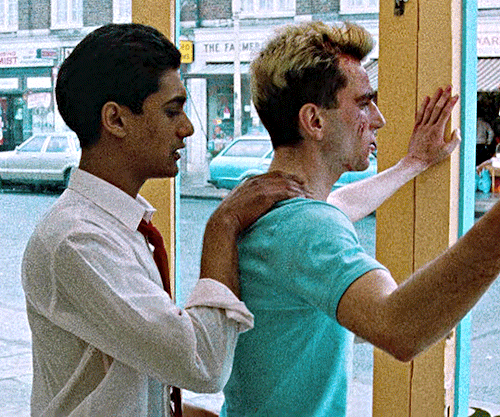
gif by @oscarskirt
For/By/About

By and About
The writer of the film is bisexual, and the main characters are queer, which puts it in a By and About Queers category. I am on the fence about the For Queer people, because again, with most of the films in Unit 2, I feel like the Race, Disability, and Class aspects of the film are more of the central voice. For My Beautiful Laundrette, the race and class aspects seem like the heavier hitters, but the reason I’m on the fence is because there are some aspects of Johnny and Omar’s relationship that aren’t verbalized that I feel like may only be picked up on (easily) by a queer audience.
Favorite Scene
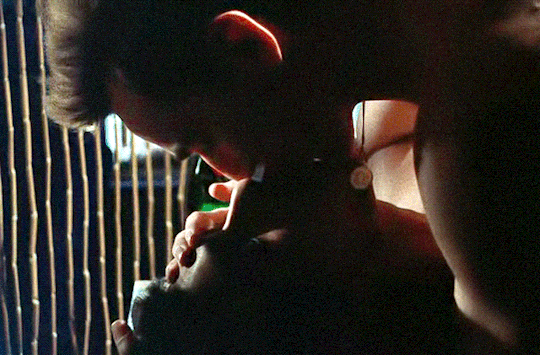
gif by @eriklehnsherryes
I really loved the scene where Johnny and Omar are fucking in the back room while Nessan and Rachel are dancing inside the laundrette. I appreciated that it felt like it was used to highlight the legitimacy of both of their relationships/love for one another. And that both fucking (and spitting champagne in to Omar’s mouth) could be presented in a way that felt romantic because it was paralleled to a couple dancing lovingly together.
Favorite Quote
“We must all have knowledge if we are to see what is being done to whom in this country”
A quote said by Omar’s dad to Johnny. I like it because it addresses what I think is the core of this film. And it shows in very few words, why he ended up this way, why he wants Omar to go to college, and where his ideology and life experience lies.
Score
8/10
I think this film falls to the classic blunder of trying to say too many things in too short of a time. As a result, we only get glimpses in to characters, and it is harder for me to see and understand their motivations.
#queer cinema syllabus#bengiyo queer cinema syllabus#my beautiful laundrette#my beautiful laundrette (1985)
29 notes
·
View notes